I Was Just Thinking: The Memoirs of William Edward Mercer 1898-1983

Foreword
These memoirs recount the life of William Edward Mercer, his childhood spent mostly in the small town of Great Harwood in Lancashire, his service in the Royal Army Medical Corps, his return home and his migration to Australia.
Being an adventurous young man he voiced his intentions to join the RAMC when he was old enough, so he was encouraged by a local doctor to lie about his age and go off to war. He tells how he travelled to Turkey, the Middle East and India describing the sights and the people he met, and his escapades along the way. When he arrived home to Great Harwood at the end of the war he realised that by now he was out of step with his home town and the people he had left behind. Many of his own friends had moved on, as had some of his family and his life lacked purpose and excitement.
He eventually met and married his lifelong partner Eda, and they were encouraged by her aunt to travel to Australia and begin a new life together. His tale continues as they cross the ocean and see new places and sights along the way. Eventually arriving in the land that would be their home, they embark on a pioneering journey of ups and downs from building a home, finding work and raising a family.
Throughout the book William is a likeable, affable character who has a natural way of storytelling. We hope you will enjoy reading it and travelling along on his life’s journey from Great Harwood, his wartime tales and his years in Australia, as much as we have enjoyed being allowed to produce it.
In 2009 William Mercer’s grandson Steve and his family visited Great Harwood from Australia. Leonie, Steve’s wife, presented Great Harwood History Society with copies of these memoirs that William had written for his grandchildren, which she had transcribed and produced in a book form along with a collection of pictures. GHHS decided that these memoirs were worthy of a wider audience and contacted the family to ask permission to republish them in an edited format for a more general public. Sadly, we discovered that Leonie had died, but the family consented to allow the publication of the edited book in her memory. A percentage of the proceeds of the sales was donated to a charity in remembrance of her.
GHHS
I was just thinking…
… and I remember when I was very young sitting on a small stool beside the fireplace jamb listening to my grandmother telling stories about her grandfather; he must have been a young man in about the year 1800. He was pressed from a dance hall in Preston; navy press gangs used to wander around the ports pressing any likely young men into the royal navy, and they were in the navy for the rest of their useful lives.
He must have been in many foreign places. He told her they used to catch monkeys by putting sugar in a small barrel, leaving the bunghole open. The monkeys would slip their hands through the bunghole, grab a handful of sugar but couldn’t pull the full fist out because the hole was too small, then they shot them. They probably did that because the monkeys were mischievous.
He must also have been in the naval battles in the Napoleonic War. He told her about Frenchmen being in the sea, trying to climb aboard the British ship (they had probably sunk a French ship), and saying, ‘We cut their bloody hands off’. Those were the days of wooden ships and iron men. They had to be tough to survive.
There were many more stories, which I have forgotten. All this led me to think how interesting it would have been if he had kept a diary or written something about his times (he probably would not have been able to write). Something from the ordinary sailor’s point of the view which would have been unique. All this again led me to think what will our grandchildren and their grandchildren think about our times: 1898-1968.
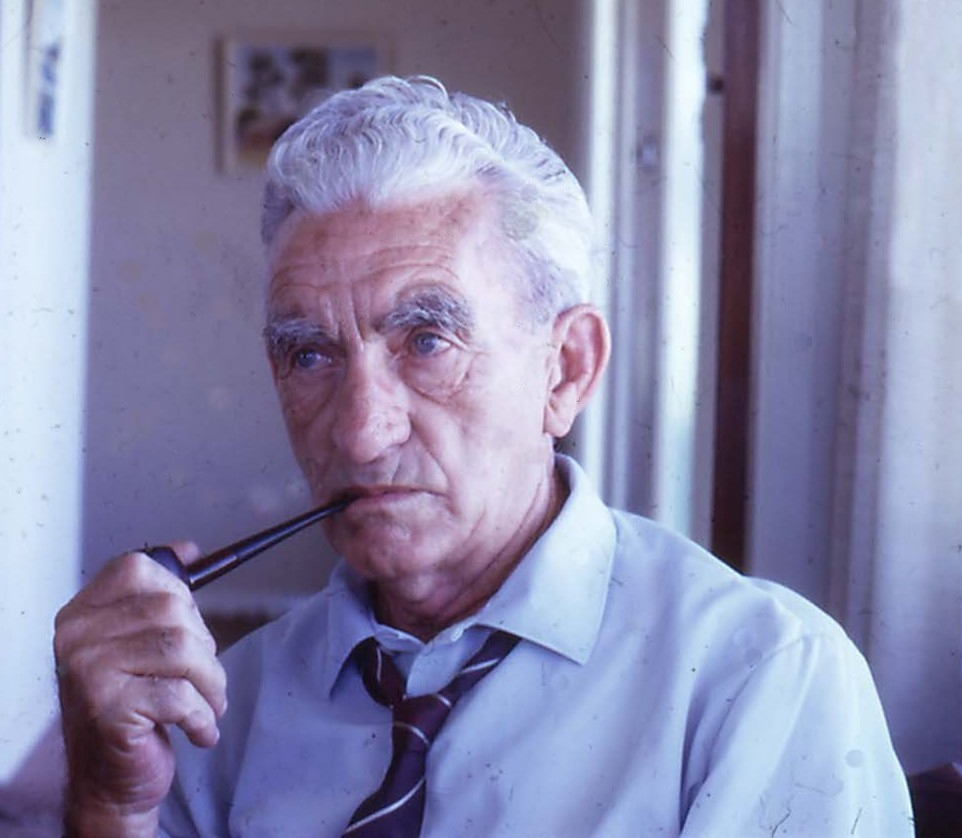
My early years
When we were born most transport was by horse-drawn vehicles. There were railways but the motorcar and the airplane were in the experimental stage. Motion pictures were only shown in travelling shows and were known as the ‘flicks’ because of the jerky and flickering movements of the actors. They were silent; commentators were employed to explain the story of the film. Later they tried to synchronise gramophone records with the film. This was a failure. I remember my grandmother saying, ‘They will never make them talk’. I wonder what she would have thought of television. Magic!
My very first memory was of my father handing to me a plucked fowl and saying, ‘Take that to your Mam’. This happened behind the local public house, which wasn’t far from where we lived. I don’t remember delivering it or anything else about it. Why this little incident stuck in my memory, I have no idea, but I have heard of other people remembering little incidents like this, which happened when they were very young. I must have been about three years of age. My only memory of my mother was when she was dead. I was in my father’s arms and I said, ‘She is on a board’. This board was part of the laying-out process before they put the corpse in the coffin. My mother must have had some nervous complaint; I was told later that they laid straw in the street in front of the house because she couldn’t stand the noise of the carts rattling over the cobblestones.
My mother died when I was about three years old and my younger sister about three months old. So we don’t remember her at all. We went to live with my father’s mother. My paternal grandmother lived in a little stone cottage at 54 Delph Road, Great Harwood; the walls were eighteen inches thick and covered with ivy. The date on the doorjamb was 1828.
My maternal Grandmother
Not very long after my mother died, my father must have taken me to Oldham, a town in south Lancashire, to my maternal grandmother. She was an Irishwoman having been born on Achill Island, which I believe is the furthermost western point in Ireland. I was told later that she had migrated from there when about sixteen to go in to service in Wicklow, which I think is on the eastern side of Ireland. From there, she went across the sea to Liverpool, where she probably met and married David Jones, my grandfather.
David Jones was a blacksmith. He died before I was born, but there was much evidence of him in my grandmother’s home. She had a copy of the famous picture ‘Shoeing the Bay Mare’, a picture of a blacksmith shoeing a mare and a donkey standing patiently at one side, in the glow of the furnace. It was a very good copy, oil on canvas, but unframed. I have seen a print of the original.
All his tools were there, hammers and tongs, and knives of peculiar shapes for paring horse hooves, and a branding iron which puzzled me for a long time, the ‘D Jones’ being the wrong way about. Later it was quite obvious that the branding iron was held on the hot steel and struck with a hammer which brought the ‘D Jones’ the right way about on his work.
Grandmother had a small wooden anvil which, when the top was taken off, was a trinket box. Grandfather had the wanderlust and often walked out of the house to disappear for weeks or months, leaving the family to their own devices. On one occasion he was away for three years; he went over to Canada to work on the Canadian Pacific Railway. After three years, he walked into the house, as though he had just been down the street.
I must have inherited some of his wanderlust; I was told that I was twice picked up at the police station, a ‘lost child’, and that I was entertaining the policemen while they were feeding me with hot soup. The police station was about two miles from where I lived, so I must have walked through the heart of the city. I don’t remember anything about it.
When my grandfather died he left my grandmother in poor circumstances, with two sons and two daughters. The younger daughter was my mother who was a velvet weaver and the elder daughter was a lady’s maid at some place. The two sons were teenagers when I went to live with them. My grandmother took in boarders to make ends meet. One of these boarders was an Irishman, who was probably drunk when he let me fall from his knee. I fell with my head on to the knob of a damper (the damper was a drawplate, which when pulled out allowed a draught to go under the oven for cooking). My skull was fractured and I can still feel the indent in my forehead to this day.
I can remember sitting on the kerb outside my grandmother’s house, in petticoats and a little fur coat with a bandage around my head. In those days little boys wore petticoats until they were about five years old. When they were put into trousers, it was called being ‘breeched’ and it was quite an occasion, and called for a celebration. I liked being at grandmother’s house because I was allowed to run wild.
I remember standing at the corner of the street with other boys, we had what we called winter warmers, which consisted of a tobacco tin stuffed with raw cotton, of which there was plenty in Lancashire; the cotton was set alight and we blew through the holes in the sides till sparks flew. This warmed our hands, and was supposed to warm our legs when put into our trouser pockets; a wonder we didn’t set ourselves alight. I remember throwing a stone through the window of an empty house and scampering off home. I arrived home panting, and my Uncle David who would be about sixteen at the time, saying ‘You young devil, what have you been up to now?’ He never found out.
For a halfpenny, we kids could do the Circular Route, a tram ride round the city. We used to sit in the front seat on the top deck, which was open to the sky, and sing the popular songs of the day, which if I remember correctly, were Boer War songs. Kids who are allowed to run wild become precocious, and at six or seven we were well able to take care of ourselves.
My Uncle David was a sport, but Walter the younger brother was a very quiet young man who occasionally had epileptic fits, caused by a fall from a wall onto his head, when he was younger. David had pinups of all the boxers, wrestlers, etc in his bedroom. He taught me all the wrestling holds and had me boxing the other kids in the yard. He had a punching bag hung from the ceiling, and he would fight anybody his weight for a pound. He taught me to swing Indian Clubs, and one day he took me down to the pub, stood me on the table and told me to swing. I went through my repertoire and then he told me to go round with my cap. I got a few pennies but I was ashamed; I felt like I was cadging.
Home again
About this time my father married again and came to Oldham to take me back to Great Harwood. I don’t remember much about my stepmother; I think she was a drunk. I remember seeing her drunk once and it wasn’t a pretty sight. Her mother, who minded us while father and stepmother went to work, was a strict Anabaptist on one side and a moustachioed virago on the other, and tormented us with her restrictions. Can you imagine me, who had been as free as the wind, under such conditions? She would have ruined my sister and me, had the marriage lasted. The marriage didn’t last very long; it was a failure from the beginning. When it finally broke up, my father took us to live with his mother again. My paternal grandmother tamed me with love and affection.
My English grandmother lived in a little stone cottage on the edge of the town. This was a ‘grace and favour’ house belonging to the Church of England. There was a date on the door-jamb: 1828. The walls were eighteen inches thick and we children could sit in the windowsills inside. The doors were massive and the lock was about ten inches by seven inches and the key was six inches long, and must have weighed a quarter of a pound. The lock was supplemented with a big iron bolt. The whole place was covered with ivy, not the common ivy, but a kind my grandmother called ‘Hiven’. The tiny reddish purple leaves would show in spring, these would then develop into green leaves as big as my hand and in autumn would turn to red and gold and fall off, so the house was never damp. I often had the job in summer time, of cutting back the ivy tendrils from around the windows with a pair of scissors. The roof was covered with flagstones an inch thick. The rafters must have been oak beams, and massive, because the roof showed no sign of sagging and we had never had a leak. Under the stairs was the buttery, with flagstone shelves and a bread crock on the floor. Bread was baked once a week and kept nice and fresh in this crock, which would hold a dozen loaves.

54 Delph Road, Great Harwood.
This shows the ivy that William had to keep trimmed.
Butter and cheese and milk and eggs were kept on the shelves. It was always nice and cool. There was a small leaded light window, the panes of which had been poured, not rolled, and these panes were much thicker in the middle and when you looked through them the outside world was distorted.
I was sent to the nearest school, which happened to be Wesleyan. The schools all seemed to be denominational, subsidised by the government I suppose. I attended for kindergarten and first class. Then my grandmother decided to send me to the Catholic school, which was on the other side of town. I had to go with two little girls, O’Neills I think. We arrived late; they were saying prayers and we had to kneel down just inside the door. When the prayers were finished the Head Mistress came along with a strap and gave us a hiding for being late.
I was allotted to a class, and I think I surprised the teacher by being able to answer all the questions, having had that lesson before, but the belting I had secured at the start still rankled and I decided that that place was no good for me. So, at playtime, I climbed up the lavatory door and over the outside wall and went home. I refused to go to that place anymore and my grandmother gave in and sent me back to the Wesleyans.
We had flag footpaths around the house. One of the flags at the back of the house had a date carved on it, 1606, nicely carved with a border around it. It had probably come from a previous building on the site. We had a sizeable garden back and front, with stone walls around them. The front garden had been so built up over the years that we had to mount two steps to go into it. In the springtime my grandmother would say, ‘Go to the market and get one dozen Canterbury Bells, one dozen Stocks, one dozen Asties and one dozen Sweet Williams’. These were merely to supplement the perennials, which came up every year. There were a lot of bulbs in the ground that came up year after year, crocuses, daffodils and tiger lilies. The crocuses were the early birds and often came up through the snow, purple and yellow and white. The footpaths in the garden were made up of cockleshells, collected on annual holidays at the seaside. I remember one plant much like a succulent; after a shower the rain would gather in dewdrops on the leaves and these dewdrops would glitter in the sun, beautiful. Visitors would ask, ‘What do you call that?’ and grandmother would reply, ‘Mind your own business’, then she would laugh and explain, ‘That is the common name of it. I don’t know the botanical name.
Grandmother used to plant climbing nasturtium seeds at the bottom of the walls and by midsummer the walls were covered. Where the bees came from I don’t know, but the place used to hum. If you came home late at night the bouquet of scents was something to remember.
My grandmother was a great collector of china ornaments. She had a collection of china dogs and horses, all highly glazed. I used to like to stroke them because they were so smooth. She had a set of little brown jugs, brown and gold, and many ornamental plates with landscapes and hunting scenes on them. I remember one piece, a rose bowl with a seat, a cavalier standing and a lady seated, and written in gold letters ‘Come along, these flowers don’t smell very nice’, and when you turned it around there was a little boy squatting with his trousers down. The plates and jugs were never used and reposed on what was known as the pot shelf. Occasionally they were taken down and carefully washed in soapy water until they gleamed in the lamplight.
England is a comparatively cold country and the focal point of the living room was the fireplace. The fireplace had ornamental jambs and a seven-foot over mantel on which was a set of brass candlesticks, six of them. The fireplace was black-leaded; the black lead was put on with a brush and another brush used to polish it. The workday fire irons, i.e. ash pan, fender, tongs and pokers were made of steel and had to be polished with emery paper, but on Friday night brass fire irons were brought out from under the couch for the weekend. The weekday lamp was just a plain glass kerosene lamp, but on Friday evening out came the reading lamp; this had at the base a foot of entwined bronze dragons, a pink bowl for the kerosene, two and a half inch wicks, covered with a plain glass globe and one bigger globe with yellow flowers on it. During the week this lamp reposed on the chiffonier. This chiffonier was grandmother’s pride and joy. It was a set of drawers nine feet wide, made of Honduras Mahogany, highly polished, with brass handles, and we kids were so well trained that we never went within two feet of it, at least not when grandmother was around. This room also had two big rocking chairs and a couch with covers, two ladder-backed rush-bottomed chairs, a table and a homemade hearthrug. All very Victorian, but cosy and homely.
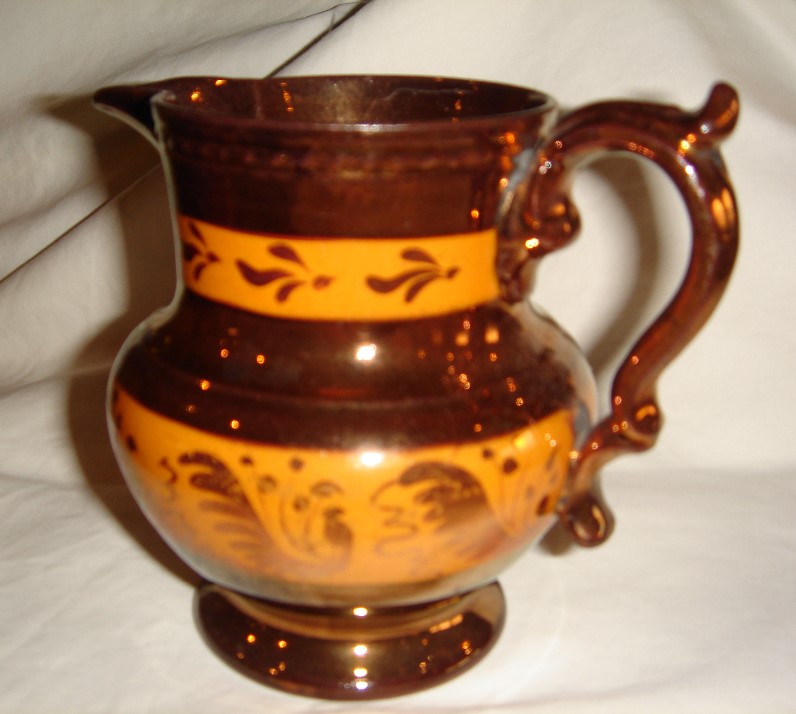
(William’s grandmother.)
Grandmother’s hair was naturally curly but she parted it in the middle and pulled it severely back and wound it into a bun at the nape of her neck.
Great Harwood was a market town, and every Friday night a market was held in the town square. There were about forty stalls selling everything: shoes, cheese, fruit, crockery, chickens and rabbits. A pair of ex-soldiers sold rabbits; they were well known characters named Sandy and Pazza. They always had a crowd around the stall listening to their wit and repartee, ‘Fine fat rabbits, legs like farmer’s daughters, bellies like landlords, sold again and got the money, wrap it up Sandy’. There was often a man with an amusing line of patter selling a cure-all, probably a solution of liquorice and sugar. If it did you no good, it would do you no harm. We kids would buy a halfpenny lucky bag. In the lucky bag would be a small toy (perhaps a monkey on a stick) and a few lollies. Alf Fifty had a marquee and sold hot peas. For one penny you would be provided with a pint mug of black peas and a spoon – very good.
Sandy, Pazza and Fifty were nicknames. Quite a lot of people had nicknames. I remember, ‘Collier Dick’, ‘Celery Joe’, ‘Dick O’Bows’, ‘Dog Arse’, ‘Old Nip Currant’, a storekeeper, and ‘Old Blood’, probably because his working clothes were splashed with red dye as he had worked at the dye works. One man was known as ‘Harry Shit’. He was a gardener and must have used a lot of manure.
My father was known as ‘Medlar’. The story goes that his grandfather had backed a foot runner who was called ‘Medlar’ and had won a lot of money. The nickname was passed down from father to son. I was often addressed as ‘Young Medlar’ by older men. There was a saying they used; ‘Old Medlar and Young Medlar, Old Medlar’s son. Young Medlar will be Old Medlar, when Old Medlar’s done’. These nicknames were so much used that people forgot their proper names. I remember a man coming to our house and enquiring for Mr Medlar.
Great Harwood was a cotton-weaving town with a population of 15,000 and twenty three weaving mills. If you went up the hill (1,700 feet) behind the town during working hours you could hear the place buzzing. And if you were there at knock off time, when all the mills stopped, the town seemed to die and you could almost feel the silence.
Great Harwood was built of stone from the delphs on the hill behind the town. Masoned stone was used for the fronts of the houses and rubble stone for the backs. The footpaths were made of flagstones about five inches thick. Generally there was an extra big one in front of a doorway measuring about eight feet by six feet. The streets were paved; the pavers were masoned and about twelve inches by six inches and six inches deep, they were properly laid on a bed of ashes and the road cambered to the gutters. They then swept stone chips into the nicks and poured in pitch. The paviours were ranked as bricklayers. I think these roads would last forever. The stone was easy to keep clean and every time it rained, which was pretty often, we got a new look.
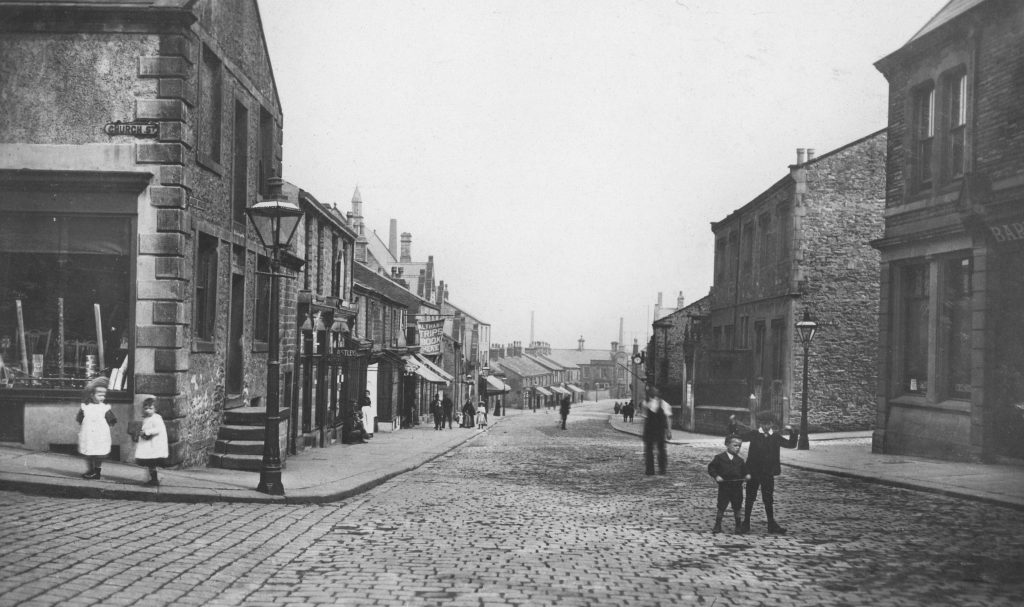
I must tell you here about the ‘flags’. The hill behind the town was composed of sandstone with only a few feet of overburden. This sandstone must have been laid down millions of years ago. These strata of sand (I should imagine) would be eroded from the cliffs of the land. The strata of sand were interspersed with a thin layer of vegetable silt, probably brought down by rivers in flood. When huge blocks of stone were blown down by explosives, wedges were inserted into the silt layer and the slabs were split off so cleanly that they needed no trimming. These slabs were made into squares or oblongs suitable for whatever was required. The whole town was built from hardwearing sandstone including houses, roads and footpaths. The thinner slabs, say from one inch to four inches were known as flags. One-inch flags were laid like big tiles on the roofs of houses in the early 1800s, but were superseded by slate from the slate quarries in Wales.
We lived at the top end of the town almost under the hill. As a boy I spent all my spare time on the hill. It was approached by way of the ‘old bent’, a sunken road which had been made by the carts coming from half a dozen delph quarries. The road had been worn down by six to ten feet below the level ground. It was topped by hawthorn hedges, which were a wonderful place of hideouts, bird’s nests, wild strawberries and blackberries. The top of the hill was always windy and on a fine summer’s day great white clouds would be sailing along. There would be as many as half a dozen skylarks singing at once.
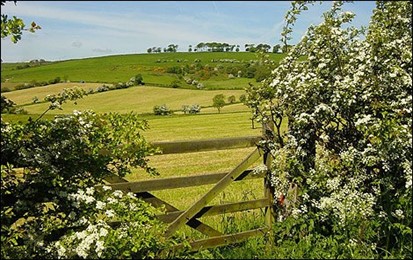
There were a few dairy farms on the hill. The cows spent all the winter in the shippons, were hand fed and only let out to drink after being milked.10 They were let out into the fields in summertime, to chew the cud and sit in the sun. The grass was very poor, coarse like buckram.11 The farmers were prosperous because they sold their milk straight to the consumers – no middlemen. They took their milk around in milk floats, two wheeled, gaily-painted carts with shining cans – milk, skimmed milk which we called blue milk, and cream. The farms were very old; two I remember with dates on the door lintel of 1606 and 1609.
We played ‘hop, step and jump’ and ‘stand back-stand in’, between bird nesting and climbing trees. We made collections of birds’ eggs and leaves and caterpillars. We were regular young naturalists. On weekends and holidays we went further afield. Sometimes we walked as much as twenty miles there and back to the famous Stonyhurst College.12 In summer time the Ribble Valley was beautiful. In May all the hawthorn hedges were in bloom.13 From Cronshaw Chair, a high rocky place, it looked as though there had been a snowfall and all the air was scented. No one ever picked hawthorn; it was considered unlucky to take it into the house.
We often raided ‘Old Henry’s’ pear tree. It was about twenty feet high and had never been pruned. The pears were unsaleable, being very small; he probably fed them to the pigs. We used to throw up a stick and then the pears would rain down. We wore knickerbockers, trousers buttoned below the knee, and we filled them up until we could scarcely walk.
We could always tell when Old Henry was coming. He had to come through a small tunnel under the railway where he kept fowls. When the fowls came rushing out, ‘Here he comes!’ He must have been about eighty. He used to shake his stick at us and shout at us, ‘I’ll skin ye young devils alive’. This amused us greatly. I don’t think he really minded. The pears were sweet and we never suffered any ill effects.
In the wintertime we played bowl and hook, with an iron hoop about three feet in diameter, which we pushed along with an iron hook. We got quite expert and could perform complicated manoeuvres with them. When there was snow on the ground we used to knock sledges (pieces of steel about six inches long with two spikes) into our clogs, which had wooden soles. With the snow trodden hard on the footpaths, we would scoot along like ice skaters. The clogs were not like Dutch clogs, but more like a shoe with wooden soles. The leather tops were nailed to the wooden soles with brass tacks. Some of the men’s clogs had pointed toes and patterns cut into the leather – quite flash.
The girls played ring games in the streets, like ‘in and out the windows’, ‘stand and face your lover’, and ‘my fair lady’. After about seven years old the boys no longer played with the girls.
We spoke in broad Lancashire dialect. People from the south of England couldn’t understand us but we seldom saw people from far away. There wasn’t much travel in those days. Boys and girls were ‘lads’ and ‘lassies’. And we used ‘thee’ and ‘thy’, except to our elders; it would be considered cheeky to address anyone older than yourself as ‘thee’. We had to speak what was known as ‘proper’ at school, but lapsed into dialect as soon as we were outside.
I was considered a fair average scholar at school and reached standard six when I was twelve years old. At twelve we started in the mills. I don’t ever remember being asked, ‘What are you going to be when you grow up?’ It was understood that we went into the mill. At first, we were known as half-timers; half a day at the mill and half a day at school. At thirteen we were working full time. We then got two looms next to the person who had taught us to weave. Generally it was the father or mother. In my case it was my father. We worked 56 hours a week, with one week’s holiday a year without pay. In wintertime we went to work in the dark and came home in the dark.
It was now that we got fresh mates, making friends with other youngsters who worked in the same mill. We didn’t have much money. Most of us got pocket money of a penny in the shilling on our wages. A two-loom weaver earned about twelve shillings a week, so we got one-shilling spending money.
The war years
Joining up
It was about this time I joined the Boys’ Brigade. Most of our officers were either Sunday School teachers or St John Ambulance men. We were taught first aid and gymnastics with a talk on how to be good boys in between. We had a very good gym instructor, an ex-army man who could do the ‘flying angel’ on the horizontal bar.14 We used to meet every Thursday night. We had church parades about once a month and an occasional picnic parade to some place that catered for picnic parties. We used to raise our own money by collecting newspapers. We had them by the ton and we sold scent cards, a penny each. One could smell them a mile off.
On our off nights we wandered around the town singing the popular songs of the day, ‘Alexander’s Ragtime Band’, ‘Play a little Ragtime on your Violin’, and ‘Ragtime Cowboy Joe’. We were a pretty harmless lot. The Boys’ Brigade seemed to be a kind of apprenticeship for the St John Ambulance. Quite a lot of the boys joined the St John when they became sixteen or seventeen.
In 1914 when the First World War broke out I was sixteen. Most of our Boys’ Brigade officers and our older mates were called up and went off to Netley Hospital in Southampton, while Alec Chippendale (known as ‘Chip’) and I looked enviously on. We were determined to get in somehow. We joined the St John first aid and sick nursing classes at the St John headquarters in Accrington about three miles away. We walked over there every Wednesday night. We were swotting all the time and we knew the name of every bone in the body, all the pressure points for stopping bleeding and all the antidotes for stopping poisons. We used to recite them as we walked over to the classes. The exams were about six months later. I got to show the treatment of a simple fracture of the forearm and some simple questions, after all that swotting. We got our certificates!
We had told old Doctor Clegg that we intended to join the Royal Army Medical Corps (RAMC). He said, ‘How old will you be at the recruiting office?’ We said, ‘Nineteen’. Says he, ‘That’s right’. The old devil! We went to the recruiting office on the 10 April 1915 and after a cursory medical examination we were sworn in. We said, ‘Nineteen’ without batting an eyelid. I had just gone seventeen. We were told to be at a certain place on a certain date not long after. When we got there, there were ten of us and a St John sergeant, who was to retain his rank in the RAMC. We were to proceed to Fort Pitt in Chatham, Kent.
I didn’t join the army from any great patriotic motive but for adventure, and to get out of weaving which I thoroughly hated. So, we proceeded to Chatham, which was quite an adventure to me as I had never been more than 30 miles from my hometown before. We arrived at Chatham in the blackout and we were pulled up every hundred yards with a bayonet under our chins. ‘Halt who goes there?’ and the sergeant had to say his piece. After supper (two thick slices of bread, a tin of salmon between two of us and a big bowl of cocoa) Chip and I slept on the altar steps in the mess room/come church on Sundays. Next morning I was told by some men who worked in the dining hall that the tables had to be scrubbed. I was told to carry out all the tables and forms and scrub them.15 They helped me to carry them out and went off, as I thought, to do some other job and I proceeded to scrub them with soap and scrubbing brush in my nice navy blue suit – my first suit with long pants. I had pretty near finished them when I became a bit suspicious. I peeped into the mess room. The rest of them were playing cards. Oh, the mug recruit!
In a couple of days we were issued with uniforms and I bundled up my soap-stained suit and sent it home. At first the uniforms fitted where they touched but, after a bit of swapping around, I got somewhere near it. There were German prisoners at Fort Pitt, both army and navy. They were probably regulars. The army men looked quite smart in field grey with a thin red stripe down the pants. They were walked around the fort for exercise. Corporal Angus VC was also there (what was left of him).16 He had a patch over one eye, and one leg swinging in his crutches.

The RAMC insignia is clearly visible on the window in the background. The motto of the RAMC is In Arduis Fidelis and can be translated as ‘Faithful in Adversity’. It sums up the character and the ideals of the soldiers and officers who wear the badge, and is just as applicable in times of peace as it is in war.
Two days later we were on parade. Chip had a sore throat and he had wrapped a silk handkerchief around his neck, it was just showing. All our officers were doctors and when they saw Chip and his silk handkerchief he was sent off to the observation ward. They were scared of Cerebrospinal Meningitis (Spotted Fever), which was a killer in those days and very infectious. So I lost my pal. It wasn’t Spotted Fever.
The rest of us were sent off to Lees Court at Faversham about twenty miles away. Lees Court was a country mansion; they had cleared everything out right down to the parquet floors, except for pictures and clocks. We proceeded to fill it up with beds and hospital gear. There were two doctors, about eight sisters who ranked as captains, about twenty RAMC men and room for about 100 patients. So you can get some idea of the size of the place.
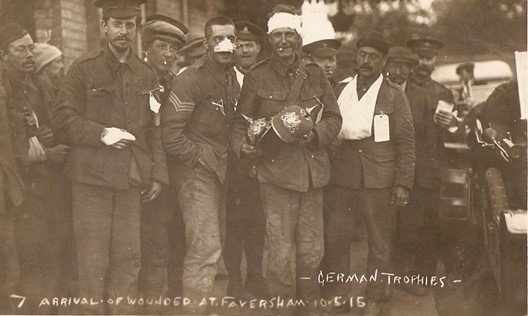
The staff sergeant in charge of us was a martinet. He was a cock sparrow of a man with a tailored uniform and a little waxed moustache. He got my gorge. He didn’t like me either, probably because of my Lancashire accent. He gave me the job of cleaning the bathrooms. I soon became expert and finished the bathrooms by eleven o’clock. I used to lock the last bathroom door, have a bath, sit in a wicker chair, read the paper and admire the Japanese prints on the walls. After lunch I had to clean brasses which, being done regularly, weren’t much trouble. I had to get the milk from the home farm before breakfast. I collected mushrooms on the way back; we often had mushroom with our bacon.
We got our first patients from Neuve Chapelle. They were only slightly wounded, having been cleared out of the French hospitals to get ready for another big attack. I got some ward work then. I remember a young man in the Northampton regiment. He was shot through the cheek and out the other side, playing havoc with his teeth on the way through. He couldn’t talk and looked so forlorn, I felt sorry for him. I used to feed him through a feeding cup with a spout on and generally look after him. When he got his mouth cleaned up he was so grateful and when he got a parcel from his home he lashed me up with cake and chocolates. About the worst case we had was a Lancashire lad with his elbow shattered. The bones on each side of his elbow were in little pieces. The doctor let him smoke while he picked the pieces out. He would never go back to France.
Gallipoli
About the beginning of August 1915, a notice went up on the board wanting volunteers for service abroad. I couldn’t get there fast enough. About fifteen of us marched out one day and I gave the staff sergeant a big smirk as I went by. Please remember I was only a teenager.
We went back to Fort Pitt and I met Chip again and we went out together. We spent most of our shilling a day on food. We used to go to a place and have sausage and mashed potatoes, ‘Two zeps and a cloud’, they knew what we meant.17 We got a really good officer here. He used to take us on route marches and as soon as we got out of town, ‘March easy’ and we sang marching songs. The wags soon had parodies to them. Example of a marching song, sung to the tune of ‘Little Red Wing’:
Oh, the moon shines tonight on Charlie Chaplin, His boots are crackin’, for the want of blackin’, And his little baggy trousers, they want mendin’, Before they send ‘im – to the Dardanelles.
We used to stop in the woods and we would send men out, with a ticket for either a gun shot wound in the leg or shot through the chest. We had to bring them back and show and tell what we had done for them. Really good training. Off we would go again. I think this officer must have lived in Kent because he knew all the nice places. We generally finished up with some ‘ladies aid’ or someone giving us tea and cakes. I remember Cobham and The Leather Bottle pub where Dickens used to drink.
It was a beautiful summer, too good to last. Our officer took us to Aldershot, a real military place. He made us a goodbye speech. He was a good bloke. As soon as he went a corporal took us over and we soon knew we were in the army. This was the place where we learnt to obey without question; right turn, hair cut, every second man, was commonplace, they gave us a ticket and we had to go, even if you had it cut the day before. Some of the men had 00 clippers all over to try and beat this racket.
Chip had been left behind at Fort Pitt and it was at Aldershot that I made a fresh pal, Bill Sykes (shades of Charles Dickens). I referred to him as Old Bill. He was about 28. We slept on the floor in the old married quarters. We never stayed out late, not after nine o’clock. We went home and polished our boots and buttons. We had to be on parade at six o’clock in the morning spick and span. The town was full of military police and if you had as much as a button undone they would march you back to barracks. The punishment was coal fatigue or peeling potatoes for the cooks. We never got caught, we were very careful.
We saw a lot of drafts go out to France from here. One was a regiment of Bantams, little men under normal military height, and they seemed weighed down by their accoutrements. I believe they gave a good account of themselves. A little man is as good as a big man with a rifle, and is a smaller target. The sergeants who drilled us were sarcastic and had a stock of epithets, enough to make your hair curl. One would have thought that we were the scum of the earth. Some of them were quite amusing but we daren’t laugh. So we weren’t sorry when we were drafted.
We got on the train and hadn’t the slightest idea where we were going. We boarded a ship called The Panama late at night in Newport in South Wales. Next morning we were on our way. There was a lot of speculation and rumours but when we kept on due south we knew it wasn’t France.
All the troops sleep in hammocks on troop ships so we had to learn the art of getting into a hammock in confined space, which is not easy. The hammocks were slung on hooks in the low ceilings. Hammocks everywhere, even on the mess decks.
After a reasonable voyage we landed at Malta, an island in the Mediterranean with a long history. We never thought of submarines; we learnt later that there were plenty in the Mediterranean. We went to Floriana and later to a hospital in Valletta high on the shore of the harbour. Most of the streets were steep and were mostly steps. I was put on the wards, floor polishing and scrubbing lockers among other things. This ‘maid of all work’ wasn’t to my liking.
One morning I went on duty at 6am and found that my workmate had been on emergency duty during the night and wouldn’t start until 8am. I was supposed to tidy up the beds, cut bread for about fifty patients and boil eggs for some. I had never known this before, making breakfast on the wards. I don’t know the reason. Being single-handed, I was behind when the sister arrived at eight o’clock and we had a set to. I gave as well as I got but she didn’t report me. I think I got away with a lot on account of my youth.
That same night I was on emergency duty. When I arrived on the ward at midnight, lo and behold, the same sister! She was on emergency duty too. We had a patient with a painful kidney complaint and we were packing him with hot water bottles all night. She was tired like me and was very sarcastic. It was a long, weary night. When I went off duty in the morning, there was a notice on the board, ‘Wanted: Volunteers for Gallipoli’. ‘Come on Bill’, I said to my mate. Bill was a bit reluctant but he came; however he failed to pass the doctor so I lost another mate. We were issued with tropical kit and all packed up and ready to go by 11am. I’d had about two hours sleep in the last thirty six hours. We marched down to the wharf and boarded a ship with hundreds of horses on the deck above us. Stamp, stamp, bang, bang. Stamping horses. This was going to be a wicked trip.
At the very last minute, the RAMC men were called up and we went aboard the hospital ship Kara Para. This was better, plenty of room and better food. We sailed away for Gallipoli, very conscious of submarines this time. The troop ship Royal George had been sunk about a week before. About 100 RAMC men had gone down with the rest of the troops.
We had good weather as we sailed through the Aegean Sea with beautiful islands all around us. It was a pleasure trip. We sailed into Mudros Harbour; the island was called Lemnos, the village was Mudros. We saw four big liners anchored there: the Lusitania, the Mauritania and I think the other two were the Olympic and the Aquitania. I am not sure about the names of the last two but they all had three or four funnels and were the biggest ships of their day.
After a few days we sailed for Suvla Bay. It was 5 November 1915, Guy Fawkes Night. When we got near, we could hear rifle fire and machine gun fire and star shells going up every few minutes. It was a regular Guy Fawkes Night. We landed at Suvla Point and slept in the open on a hillside. Awake at dawn, we heard a shell whistling through the air and all dived into the nearest hole. A rueful laugh as the shell went into the sea a mile away. We soon learned to tell by the sound when they were going to drop near to us.
We were apportioned out to three field ambulances and one casualty clearing station. About ten of us went to the 40th field ambulance that night and slept in the open again, waking up with heavy dew all over us. Next day we dug ourselves a dugout. This is a hole about seven feet square and six feet deep. We threw up the dirt on the enemy’s side and covered the hole with rubber groundsheets, cutting shelves in the sides for our gear, of which we hadn’t much. There were four men to each dugout. I was put in B section, stretcher-bearers, which suited me.
We went up to the trenches every night crossing a dry salt lake. A small stream ran through the lake with a single plank across it for a bridge. This bridge was a bit of a hazard on a dark night, especially for the back man on the stretcher. If we had put anything bigger across, the Turks would have blown it up.
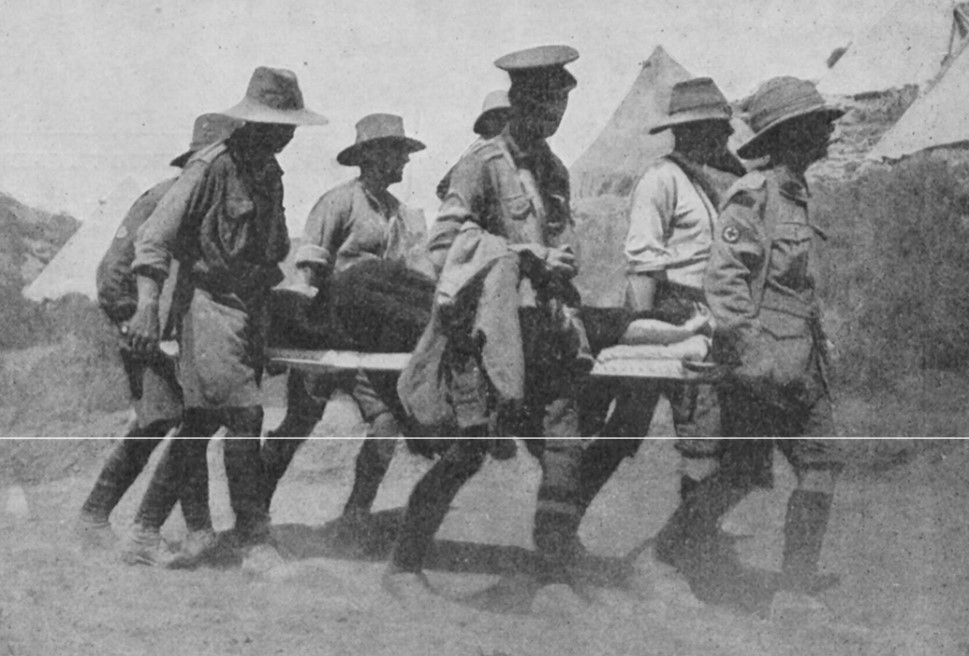
When we came to the foot of the hill there was a tree. Captain Glen would quietly halt us, ‘Two squads sprint by when the next shot goes off’. I think the Turks must have had a rifle mounted on a tripod that lined up on the track and they fired it every few seconds on the off chance of hitting somebody. I think the tree must have been full of bullets but we never stopped to see.
One day we had to go to Lala Baba. Lala Baba and Suvla Point were the two horns of the bay and the only places where one could get real cover; General Headquarters, the mule lines, and stores were there. We had to get a wounded man from General Headquarters down some steps and along a ledge cut into the cliff face. He was facing the wrong way, as we wanted to take him up the steps headfirst so we backed into a cave entrance, which had a blanket for a door, to turn round. A loud cranky voice, ‘Get that man out of here’. It was General Munro. I think he was the man who organised the eventual evacuation and he did a good job.
Another day we were watching a water wagon drawn by four mules, travelling along the beach road. This must have been an emergency as it was very seldom anything moved along that road during the daytime. Sure enough, down came the first shrapnel shell and knocked the driver off his perch. One of our men ran over and crouched behind the cart for the second shot, which knocked out the two leading mules. He cut them out of the harness; we grabbed the shafts and he drove the two mules and the cart to cover. Then we had to go and get the driver (more about this man later).
Most of our patients went straight to the casualty clearing station after first aid. We had a few tents for patients if necessary, but the tents were full of bullet holes and very leaky. The Turks respected the Red Cross so long as we kept quiet. They could have blown us into the sea at any time. We built some ablution benches. They let us finish building them, and then blew them up.
One night I was detailed to the ration party. Away we went to Lala Baba. We drew the rations and loaded them onto small carts, which were drawn by two small mules about the size of a donkey, and started for home. About halfway there the sergeant seemed to think we were on the wrong track. There was what seemed to be shallow water about eight feet across. The sergeant thought that the track was on the other side of the water. He tried to get the Indian driver to pull over but he would not have that. The sergeant then went to the mule’s head and pulled it over. The water was about three feet deep. The sight of the sergeant up to the waist in water and the driver’s explosive outburst in Hindustani were too much for me. I doubled up and laughed till the tears ran down my face. We had to unload the cart before we could get the mules out. The driver was on the right track after all. On 17 November (I remember the date because it was my father’s birthday) we were sitting in the dugout when it started to rain. It rained very hard and then after a while it started to run into the dugout. We stood on ammunition boxes for a while and then we had to get out, as it was filling up rapidly. I tried the patients’ tents but it was pouring in there. I even tried the operating tent but that was a wet, miserable place. At last, I found a tent a little better than the rest and I lay there shivering for the rest of the night. When it came light, I saw that the man next to me was one of my dugout mates. He must have known who I was, because I had spoken to him when I got into the tent the night before. He was rolled up in about seven blankets. He was no longer a mate of mine.
The next day we had a lot of frostbite cases. We wrapped them up and took them to the casualty clearing station, which was across the road and on the beach. They told us that both the Turks and the British had to get out of the trenches and declare a truce until most of the water ran away. Someone must have been bailing out the dugouts while we were on that job. I don’t remember doing any bailing myself.
The next night we had to go to the trenches but we couldn’t go the usual way because the salt lake had risen and covered our track. We had to go around the Lala Baba towards the Australian sector, all of six miles. When we got to the trenches we went into a big dugout. A sergeant major was lying on a cot. His sergeants were persuading him to stay where he was until better weather. He was crippled with rheumatism and it was a bitter, cold night and wet. I was relieved when he decided to stay, as he must have weighed about twenty stone.
The stretchers were soon filled and I got two walking cases. One of them wasn’t too bad, but the other one had his head down and plodding when we started off. After about half a mile the better of the two said he would go ahead with the other party. By this time, my patient was weaving and it wasn’t long before he was staggering. It was like taking home a drunk after a wild Saturday night. He was getting worse all the time and I lost the track.
We kept falling into shallow trenches, which had been dug to fight a rear-guard action if the anticipated evacuation went wrong. These trenches were full of water and we were soon in a mess. He was game and kept going although he never said a word. I don’t know what the matter with him was. I suspected dysentery, as it makes one very weak. He probably had a ticket on him somewhere but it was too dark to see.
After a long struggle we eventually reached Lala Baba and the beach road. Everything was quiet; nobody about except a few sentries so I knew that it was long after midnight. By this time the tails of my great coat were frozen stiff as boards and were chaffing the back of my legs, although I was wearing putties. It was better going slowly, and with frequent rests we got to within a few hundred yards of the 41st field ambulance, where we had been told to take our patients. He got down here and went to sleep. I shook him and pleaded with him. I said, ‘If you go to sleep here you will freeze to death’.
I was just thinking of going to the field ambulance for a stretcher party when along came four ambulance wagons. They were great lumbering things drawn by four horses. I shouted for them to give me a hand. Either they couldn’t hear me or didn’t want to. As the last wagon was approaching I shouted to my patient, ‘Last chance!’ and dragged him up. I got his hand on the back bar of the last wagon, clamped a hand over his and my arm around his waist; he walked a few steps and then dragged. When we got opposite the 41st we both dropped off. We took the last few yards to a lighted tent with a rush and almost fell into the tent. An officer said, ‘Which is the patient?’ I gave a sickly grin and dived out of the tent. When I got back to the 40th my mates had a fire going and some bacon sizzling in the pan. In half an hour I was as good as ever. Youth quickly recovers.
It was a queer sort of life; we were always on duty. We learned to eat when we were hungry and to sleep in snatches. When we awoke we were alert immediately, like the animals. We did most of our own cooking. We were issued with biscuits, bully beef, bacon, tinned cheese, and tinned butter. The tinned butter was awful and we couldn’t eat it. All that the cooks made was bully beef stew and tea.18 We slept in our clothes and we were lousy. The lice were no respecters of persons, the officers were lousy too.19 There was always something happening, but I only remember the outstanding incidents.
The Gallipoli campaign had developed into a stalemate, the troops told us that there was so much barbed wire in between the trenches that neither side could attack. If they blew it up, it fell down again in a more tangled mass than ever. The Turks had the advantage of the hilltop positions and all their lines of communication were behind the hill, out of sight. We had no aeroplanes to spot for the artillery.
The navy came into the bay occasionally and bombarded the top of the hill. But it seemed half hearted and they never stayed long. I think they were frightened of submarines; several navy ships had been torpedoed. Kitchener came some time during December and said, ‘Get out’.20 This was easier said than done. If we could get off without casualties it would be a major triumph in itself. The evacuation was very well planned. A quarter of each unit were to get away each night. Towards the end there were very few of us left. We were encouraged to walk about and show ourselves so that everything would look normal to the Turks.
The last day we spent destroying everything. I myself hoed into a tea chest, a yard square, and scattered the tea in the sand. We cut every sand bag and slashed the tents to ribbons on the side away from the enemy. We weren’t allowed to take anything away, not even a tin of milk.
That night we paraded after dark. No smoking, no talking, no tins to rattle. We met the troops and fell in behind them. The ambulance always brought up the rear. It was remarkable how so many troops could move with so little noise.21 We could relax a little when we got to Suvla Point, and as we were too far away from the Turks for them to hear us I remember a naval petty officer shouting in a loud voice, ‘Are there any more for the Princess Ena?’ We were marched straight into a landing barge four abreast. When it was full, the hatch clanged down and we were taken out to a ship in the bay. I don’t remember anything about the ship as everything was blacked out.
The engineers were the last away. They rigged up many gadgets to deceive the Turks. One of the ideas was a fixed rifle and two tins. The top tin dripped water into the bottom tin, which had a string connected to the trigger of the rifle. The drips were regulated so that the rifles could fire at intervals. This gadget can be seen in the war museum in Canberra. The engineers then poured rum, petrol and kerosene over the stores, which were as long and as high as a row of houses, and set them alight. That was the end of the Suvla Bay.
Cape Helles on the tip of the peninsula was evacuated a week later under the protection of the Navy. We went to Mudros in Lemnos, the island that had been the base for Gallipoli.
One day we went to the other side of the island for a swim, I was playing about up to my neck when suddenly I went down, down, down. I was no swimmer and had a bit of a struggle to get back to my depth. It seemed they had been dredging for another harbour and I had slipped into the deep.
We could buy figs and oranges here, so we got a few vitamins at last. Christmas was spent on Lemnos and there were a few extra rations and a concert. We had a sergeant who was in charge of the water supply. He was called Waters and he sang a song called ‘The Village Pump’:
And to celebrate the day, in a proper kind of way, we put another handle on the wpump, the village pump.
The Middle East
We boarded a big ship in the harbour about New Year’s Day. I forget the name of the ship. We sailed on a dark, stormy night, very conscious of the submarines this time. Some of the men were playing cards and some of us were in our hammocks when crash, bang and a rending of timber. Somebody shouted, ‘Torpedoes!’ There was mad rush for the stairs which were soon jammed full. I grabbed my life belt and made for the ladder leading up to the open hatch. Somebody shouted, ‘All right, all right’. Things calmed down a bit. It seemed that a deckhouse had broken loose and crashed into a donkey engine. We got quite a thrill.
I had had enough sleep and went up top for a breath of fresh air. I was sheltered under the lee of the bridge when a young officer on watch on the bridge started to sing in a soft voice. Can you imagine being on a blacked out ship, the swish of the sea and the moan of the wind and a soft voice singing? I learned the song later, but have forgotten the words since. It went something like this:
Little white hands from the window waving, Dear brown eyes so bright and gay, All is done the sorrow and craving, Donald is coming to you tonight my dear, Sweet, sweet, heart oh my dear, There is never a sea can bar my way, Night or day, night or da-ay, There is never a sea can bar my way.
We arrived at Alexandria in Egypt the next day and then went on to Port Said where we disembarked. We pitched camp on a piece of spare ground near the entrance to the canal, with a mosque overlooking us, and we weren’t very far from the sea. We spent most of our time in the sea. It was a beautiful beach and the weather in Egypt in January is ideal. We had about a fortnight here and it was here I developed a craving for sweetened condensed milk. I had quite a few tins.
The native quarters were out of bounds to us; we were only allowed along the main street and on the waterfront. I was going down the main street one day when a civilian Frenchmen stopped me. He had no English and the extent of my French was, ‘Oui oui’. I tried to tell him that I was going to meet a friend who spoke French fluently, but I could not make any headway. I don’t know what we missed. He didn’t know what he had missed either; we hadn’t got rid of the lice yet!
We travelled down the canal on the railway that runs alongside the canal more or less to Port Suez. We travelled in open goods wagons and the wags made it a party, chiacking the camel drivers and canal workers.22 There are always a few clowns in a crowd of young men. They had picked up a lamb on Mudros and it turned out to be a ram and was christened Charlie Chaplin after the great comedian.
When we arrived at Port Suez we embarked on the troop ship Ionic, a ship of about 20,000 tons, I guess. We sailed down the Red Sea and up the Persian Gulf. It was hot, so they rigged up a tarpaulin and filled it with water. We were allowed only about ten minutes in this tent at a time. When our ten minutes was up, the man who had saved the water wagon on Gallipoli refused to get out and the sergeant reported him for disobeying an order. This was a serious matter for discipline as we were on active service.
When we arrived off Kuwait we transferred to a smaller ship, as the Ionic was too big to go up the Shat-el-Arab to Basra. Basra was a poor old place in those days. No wharves; the ship anchored in the stream, a few barges were moored alongside and then planks laid down to the sloping banks. We pitched a camp about a mile from the river.
The next day there was a court martial, and the man who had disobeyed an order was sentenced to four years detention. He started to serve the sentence in the guard tent and had to do odd jobs, which were more or less what we were doing.
It was here I saw the first case of malaria. A man called Rig who had been in the border regiment at the landing on Gallipoli, and had been wounded and was slightly disabled, had been transferred to the RAMC. He started to sweat, and had a terrific headache, the sweat just poured out of him. After about half an hour he started to shiver, we piled blankets on him and he made the whole lot shake. He had been a seaman and had had malaria before.
We had about two weeks at Basra and then we boarded a river steamer, which was a paddle steamer with a barge tied to each side. I think we went about 400 miles up the river Tigris. One day the rebel, whose detention had been forgotten, had put himself in charge of Charlie Chaplin. By this time he had a collar and a lead and was jumping from the steamer to the barge. The lead was short and Charlie didn’t get a chance to jump. He was dragged into the water between the steamer and the barge. A good job it was behind the paddles, so Charlie went swimming down the river and around the bend, and that was the last we saw of Charlie. Some Arab would get a good dinner.
We disembarked at a place called Sheikh Sa’ad and here we pitched camp. The sergeant had us march to extended order; twenty paces apart, right turn, knock in a peg every twenty paces, eight men to a tent, march to a peg, place the tent pole through the top hole and stand it upright, grab the four red guide ropes and peg them out, then peg all the other ropes out, and dig a trench round the tent, and lead it into the main trench down the middle of the tent rows, and then all hands to pitch two big marquees. In twenty minutes we looked like we had been there a week. The brigadier came over and congratulated us on our smart work.
Sheikh Sa’ad was about eighteen miles from the front and we were there about two weeks. Arab camel drovers used to feed their camels around the camps. There was very little feed, mostly prickly bushes and something that looked like Paddy’s Lucerne.23 The camels would take the stem of the bush into the side of their mouths and with a sideways pull would strip all the leaves off the plant. I think the camel drovers were spies and probably went round our flanks at night and told the Turks what was going on behind our lines. One night we were awakened by a pistol shot, the Captain Quartermaster was chasing an Arab who had crept into his tent. The Arabs were keen on firearms and would go to any lengths to get them. The infantrymen had to sleep with rifle slings over their shoulders in spite of the guards marching around the camp all night. The guards had to shoot on sight. If you had to go to the toilet at night you had to wake the next man to go with you and to warn the guards. An Indian was shot accidentally – he didn’t answer quickly enough.
About the end of March or the beginning of April 1916, we struck camp and assembled after dark; the whole brigade, which was four regiments of infantry, some artillery, transport, signals, and the medical bringing up the rear. We had two outriders with lanterns and we had to march between the lights. Soon after we started out, it began to rain. It rained hard all night with lightning and thunder. We had sixteen miles to go and, being at the rear, we were soon up to the ankles in mud. No overcoats, so it was soon running down our necks. We put our towels around our shoulders and wrung them out occasionally. At dawn we didn’t seem to have arrived at anywhere. We stood and walked about all day. It was still raining. That night we started off again. We were supposed to be looking for a camp and we got lost.
Our officers, who were on horses and had big capes on, halted us to have a confab. By this time we were thoroughly fed up; there were mutterings and growlings and shouts of, ‘Get a move on’. The sergeant was running up and down the lines saying, ‘Who said that?’ Eventually a man rode up and guided us to some tents. They had been pitched on the mud and we had to put our boots under the stretcher feet to keep them out of the mud.
In the morning the sun came out and we dried out clothes on the tent ropes and soon forgot all about it. Next night the bearer section went up to the trenches. We got into a trench and we had a lecture; there was to be an artillery barrage at dawn. We were to follow the troops over when they charged. Named communication trenches were reserved for stretcher-bearers and we had to hand over our wounded to the Ghurkhas. This Ghurkha regiment had been badly cut up somewhere and the remnants were detailed to assist us.
Came the dawn, came the bombardment. We heard the troops shouting and cheering, so over we went. We met some Turkish prisoners coming back with their hands up and soon we were picking up wounded. Every soldier carries a First Field Dressing sewn into the skirt of his tunic. Sometimes the slightly wounded had put their own dressing on and sometimes the regimental doctor had fixed them up. Sometimes we had to fix them up but we carried only shell dressings, a bigger pad and bandage for large wounds. We were soon past the last line of Turkish trenches and out on the plain. The troops advanced six miles that day. Goodness knows how far we walked back and forward all that day and most of the next night, stopping for a rest and a catnap whenever we could.
In training we had four men to a stretcher. Three on one side of the stretcher, one on the other. Three men lift the wounded man, odd man puts the stretcher under him then they lower it gently. All this went by the board; often the wounded man would scramble onto the stretcher himself.
Wounds are not painful in hot blood; it’s when they get stiff and cold that they become painful. We carried no splints. If limbs were broken, we straightened them out on the stretcher. The main thing was to get them out of danger and get them to the field ambulance as quickly as possible, and that’s the way the troops wanted it. They knew if they could get away safely they were out of it for a while at least.
One day I picked up a Turkish rifle. Captain Glen was ordering me to put it down when he noticed it was a Turkish rifle, so he had a good look at it himself. British rifles had mahogany butts and blued barrel and fitting. The Turkish rifle had a very light coloured wood in the butt and bright fittings with Turkish figuring on the back sight.
We were now at Sanna-i-Yat. One morning I was awakened by some men who were killing a snake and then we noticed that the water was rising fast in some low-lying ground. There was a battery of artillery there and soon the water was up to the guns. The horses came galloping up and by the time they were harnessed to the guns and ready to go the horses were up to the belly in the water. We received orders to get to the other side of the river. We had to march back a couple of miles to a pontoon bridge. We learned later that the Turks had blown up the riverbank and let the water into an old dried up swamp. When we got to the bridge we had to break step so that we wouldn’t swing the bridge. There was a big G S wagon in front of us.24 Something must have startled the horses, they started to rear and plunge and soon the whole lot, horses and wagon and all, were in the water. The driver managed to jump clear. All we could see were four horses’ heads going down the river.
We marched up to the front on the other side of the river (Es-Sinn) and soon were collecting wounded. When we were sitting on the side of a trench, waiting for a regimental doctor to bandage a wounded man, I was hit by a bullet. It was quite a blow and I quickly jumped into the bottom of the trench feeling inside my tunic, but no blood. When I looked down, I saw that the bullet had torn the bottom of my breast pocket and through my pay book and my soldier’s small book. When I pulled out the books, the young doctor said, ‘Quite a souvenir’. He grinned and gave me a cigarette.
It was here we saw a sight that would never be seen again, horse artillery galloping into action. The drivers were standing in the stirrups flogging the horses, which were flat out and foaming at the mouth. When they came opposite us they wheeled in unison and unlimbered and spaded in. The horses and limbers galloped off for more ammunition. I noticed that one of the horses had had its leg over the trace and the place where it had been rubbing was blood raw.
They put up a ladder (only one pole with the rungs sticking out on each side) and soon an officer was on top shouting out ranges. I believe they created havoc among the Turks, as it was point blank range just across the river. A German general, who was in charge of the Turks at Sanna-i-Yat, was reported to have said that he could hold it against a whole army.
The Turkish trenches were in the form of a ‘V’, so that an attacking force would be enfiladed from two sides. But, when we crossed the river, our artillery was able to enfilade him from Es Sinn. Rumour had it that our artillery killed 90,000 Turks, and the Turks asked for an armistice to bury their dead. All this was troops talk, but I suppose it could’ve filtered down from general headquarters and was probably true. So the German general was ‘hoist on his own petard’.25
The whole of this business was for the relief of Kut-el-Amara. General Townsend had outdistanced his communications and he and his army were besieged in Kut. We were now about twelve miles from Kut and they said they could see the flag flying on Kut, with binoculars I suppose, and another big attack was ordered. The private soldier knows very little of what is going on except in his own particular sector, but we learned later that the troops had to crawl out during the night and get as near to the Turks as possible. Whispered orders, ‘left incline’, ‘right incline’, until they didn’t know whether they were facing the Turks or not. The Turks must have heard them and sent up star shells. Some shouting, ‘Charge’, some said, ‘Get down’ and some said, ‘Retire’– what a muck up!
When we got up there in the morning, they were all mixed up like a dog’s breakfast and we couldn’t find our own brigade. We got amongst the Lancashire brigade. I saw a man in the East Lancs from my hometown Great Harwood and inquired for Herbert Taylor who lived near me. He didn’t know anything about him. I learned later that Herbert had been killed.
Later in the day Captain Glen called for volunteers and we all stepped forward. We got a Red Cross flag, about a yard square on a pole, and climbed over the parapet after Captain Glen. I think the flag must have been blowing away from the Turks so that they couldn’t see it. Anyway, they kept on firing. A young officer who was wounded in the leg and had been out in the hot sun all day started to scramble towards us. As he did so, he was hit again. We bundled him onto the stretcher and ran for the nearest hole. He must’ve had his arm close to his side when he was hit for the second time. The bullet had ripped along his ribs and inside of his arm. Corporal Eddows bandaged him up and I gave him a drink. We took him to the field ambulance. He was telling us how glad he was to get away as he had had quite enough.
At this time it was very hot weather and we couldn’t get enough to drink. We were only allowed one bottle a day, about a quart. The water came from the river and was filtered through a pair of drill trousers tied at the bottom. Soon the trouser legs were full of sand and then the water was tinted with ‘Pot-Per-Mang’ – Condy’s Crystals to you.26 It tasted like nobody’s business.
We wore helmets and a spine pad (a quilted pad which tied round the helmet by two tapes and hung down the back to protect the spine) and, of course, shorts. We were burned black and for years after my knees were a darker shade than the rest of my legs. We had no thermometers but I guess the temperature was well over 100 degrees in the shade – but there was no shade. You can imagine what it was like in the sun. Of course, there was no water for washing. Occasionally we managed a drop for shaving and after the shave we washed the rest of our faces with the lather brush. Our clothes and towels and handkerchiefs would have broken a washerwoman’s heart. I did get one bath in Mesopotamia. The Turks must have blown up the riverbank (an old trick of theirs) and the water came rushing down an old trench. There were shouts of glee as we stripped off and jumped into this muddy mess but the officer soon had us out of it and then we realised that the water must have been horribly polluted. Dead horses were often seen floating down the river and they were like big black balloons, and the black was flies.
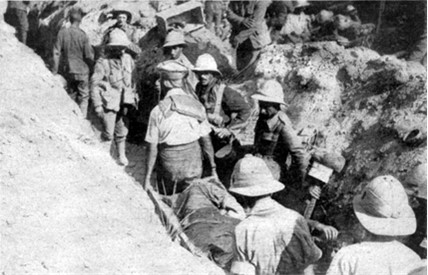
One day, when we were back from the lines, we had to dig a hole on the riverbank, eight foot square and eight foot deep. We draped a tarpaulin in this and pegged down the sides and proceeded to pump this full of water from the river. An old fashioned pump with a long handle on each side, two men on each handle, up and down, up and down. We had almost filled this when an officer came along and saw a dead sheep, which had drifted to the bank a few yards upstream. He made us pump the whole thing out and start again after we had pushed the sheep off into the stream.
Our kit consisted of haversack, water bottle and mess tin. In the haversack we had towel and soap, knife, fork and spoon, a small writing pad and pencil. On our belts hung a jack-knife with blade and spike and tin opener which we used for opening bully beef and jam tins. We had a stretcher sling that went under our epaulets and round our shoulders. The ends of the slings had loops, which went on to the handles of the stretcher so that we carried most of the weight on our shoulders. When not in use, we tied the ends of the sling behind our backs and of course the ever present one stretcher to two men – eight pounds.
If we had a place to come back to, we left our haversacks and mess tins behind. We were all lean and tough as pin wire and even I could carry the heavy end (head end) of the stretcher at a jog trot for half a mile (more or less), according to the weight of the patient. One day we were told to go and get the colonel of the Warwicks. We received directions and away we went. We passed a lot of wounded on the way, who were calling for stretcher-bearers. I suppose they would tell later how the stretcher-bearers had ignored them. When we found the colonel his batman was looking after him. He was shot through the head and was unconscious. When we got him to Captain Glen, he shook his head and said, ‘Take him to the field ambulance’. We told the Captain about the wounded and he sent bearers over there.
Later, the Turks did a lot of shelling behind the lines. We saw a mule galloping along with its hoof blown off, probably wounded in other places too. It soon toppled over and Captain Glen shot it through the head with his revolver. Then they got the range of two ammunition barges anchored on the river. They straddled them and then scored a direct hit, a big bang, not much of a flash, but a lot of billowing smoke, and the barges were no more.
There was a lot of shelling about this time, and a lot of casualties. We were working for three days and nights with scarcely any rest. On the last night, I was worn out and I had drunk all my water. My throat was so dry I could hardly talk so I took a drink out of the river. This was a foolish thing to do, and I used to think that this drink was the cause of all my sickness later on. But, when I think of the conditions we lived under, sickness was inevitable. We lived on bully beef and biscuits, with an occasional tin of jam. There were no cooks with the bearer section. We also had what were known as iron rations. These were small flour and water biscuits. We were not supposed to eat these until we had been without food for twenty four hours but we used to nibble at them all the time. Also in the little bag were two OXO cubes and a few tea cubes.27 There was no wood to be had, so we had to boil the Billy with cordite. We did this by tapping a bullet on our boot heels until the bullet was loose and then throwing the cordite under the Billy. It was a constant job as the cordite burnt very quickly.
And the flies; there were countless millions of them. You needed one hand to put the food into your mouth and one to try and keep the flies off. I only remember having one piece of fruit in the eight months I was in Mesopotamia. That was an orange given to me by a sailor on one of the river gunboats. Mesopotamia, now known as Iraq, is a great date growing place, but all the dates I ever saw were hard and green. If you were eating on a windy day, you could feel the sand gritting in your teeth. We were lucky compared with the poor devils in Kut. They had no food at all. They had eaten their horses long ago and were starving. Our army tried to drop food to them from the two airplanes they had, but this was only a drop in the bucket. The airplanes were two small monoplanes and were spotters for the artillery. They were so small you could have run them into a double garage.
So Kut capitulated. The Turks arranged an exchange of British sick and wounded for Turkish prisoners. It’s strange what tricks memory plays. I remember distinctly carrying (piggyback) some of the emaciated men from Kut, but from where to where I have no recollection at all. These were regular-army troops, fine men. They were reduced to skin and bone and I had no trouble at all carrying them, except that I was scared they might fall to pieces if I wasn’t careful.
It was soon after this that I reported sick. I was running a temperature and aching all over and utterly weary. They sent me to an Indian field ambulance. An orderly took my temperature, rushed out of the tent and came back with a doctor. He said I was 106 degrees. I don’t know if he had misread the thermometer or had it in the sun, but I didn’t feel so bad. Later, I went to an Indian field hospital, and it was here that dysentery started. I had had Baghdad Boils (tropical ulcers) all over my arms and legs for some time, but these were ignored. A young Eurasian doctor took pity on me; he gave me lead and opium pills. I had to go to his tent after dark to get them; they must have been in very short supply. These pills improved me enough so that I could crawl down to the bank of the Tigris and get on a barge full of sick and wounded and go down the river. It was a long journey. There were a lot of dysentery cases on board and the sanitary arrangements were awful.
The river was in flood, but there hadn’t been much rain where we were so it must have come down from the source in the Caucasus Mountains. The river had overflowed its banks and some Arab families were marooned on mounds surrounded by water. Eventually we reached Basra and were sent to what was supposed to be a convalescent camp where they fed us bully beef and biscuits. The conditions here were so bad that I begged the doctor to send me back to my unit. He pulled my eyelids down and said, ‘Boy you haven’t a drop of blood in your body.’ He let me go in any case – but not to my unit. They sent me to a kind of outpatients place. There was a doctor, a small man about my size, (five foot three and half inches) and he worked a twelve-hour day with about half a dozen RAMC men, including two from my own unit.
There were hundreds reporting sick every day. Some were carried in on stretchers and they were heat stroke cases mostly. I used to throw water over them, or, if we could get ice, which wasn’t very often, rub them down with a piece. I remember one case who was unconscious and in danger of choking. I had forceps and cotton wool swabs and was dragging out yards of phlegm. I got him down to 100 degrees and he went off to hospital.
After about two weeks here, the dysentery started again, and I got weaker and thinner until I was just crawling around. One day the doctor gave me a list of patients’ names and numbers for the hospital and said, ‘Your name is on that too, and don’t come back’. I remember getting on a bed in my dirty clothes and going to sleep. Next morning the doctor came round, looked at me, and wrote ‘India’ across my sheet. I think I must have been semi-conscious for a time. I remember a man shaking me and saying, ‘You’ve missed one boat, don’t miss this one’. I grabbed my haversack and managed to get onto the ship The Elephanta.
This ship was going back to India empty – so empty that she was top heavy and rolled like a drunken sailor. It was too hot to go below, so we slept on the hatch covers. It rolled so much that we had to hold onto something or we would have finished up in the scuppers.28 There were some empty horse stalls on deck that had been cleaned out. They had dividing rails about four feet high and a dividing eight-inch plank on the edge of the deck. Some of the men were sleeping in these stalls and one night we were awoken by cries and shouts. Planks, which had been stacked on the dividing rails, had crashed down on the men sleeping below. We rushed to the rescue. The dividing planks on the deck had saved them from being badly crushed. Only one man had a broken ankle. We had a burial at sea. I had seen several burials at sea; they sewed the body in a canvas shroud and weighted it with iron bars, then they put it on a stretcher and covered it with the Union Jack, the ship’s engines would be stopped and, after a short service, the body was slipped into sea.
We were now well away from the war and looking back I thought that I had only been at the fighting front for about two and a half months. But two and a half months is a long time when somebody is trying to shoot you all the time.
India
We landed at Bombay 29 and boarded a train for Poona.30 I bought a hand of bananas on Bombay station (ten or twelve bananas) and ate the lot at one sitting. It was the monsoon season and the way over the Ghats (mountains) was beautiful. We dived through tunnels and rushed across bridges over precipitous gorges, and there were waterfalls everywhere.
We arrived at Poona and paraded outside the station. I had on a helmet without puggaree, a dirty grey shirt, a pair of shorts which had been cut down from a pair of slacks and sewn with black thread, no putties, grey socks and my boots were bleached white by sun and sand.31 I had scabby ulcers all over my arms and legs and was as yellow as a canary. I had Yellow Jaundice and I weighed about six stone. A woman passing by said, ‘Oh, look at that boy’. Her husband said, ‘Come along; they’ve only come down for a rest’. I didn’t resent this and I was amused.
They took us to a hall and gave us tea and cakes, but a handful of fruit would have done us more good. We went to the Deccan British War Hospital in private cars. This hospital had been an agricultural college and there was cultivation all around us.
I had trouble sleeping in a bed as I hadn’t slept in a proper bed in about eighteen months. I felt smothered so I went onto the veranda and curled up in a wicker chair. The night sister came along and rooted me out back to bed. I tossed and turned and finally got out onto the floor and slept like a top. I got into trouble over this and had to get used to the bed.
When the doctor came round next morning he said I had malaria and Yellow Jaundice and, of course, the tropical ulcers. I had to take quinine twice a day and have two hourly dressings for the ulcers. I was one orderly’s work. Some of the men threw their quinine through the window or poured it into the plant pots. They said it only rotted their teeth. I took my dose faithfully as I wanted to get well. The doctor took my chart away when it was full; he said it was a typical malarial chart – up and down like a row of steeples. After about a week I’d had about enough of bed, the malaria was better and the ulcers were cleaning up nicely, though I had so many bandages it looked as though I had been in an explosion.
I used to sneak down to the canteen and buy chocolate and condensed milk. Later, when I was allowed out, I wandered around the estate. There were plots of cotton, maize, sugarcane and a lot of things I couldn’t recognise. It was here I found out that peanuts grow in the ground and not on bushes as I had thought. One day I found a plot of ripe tomatoes so I whaled into these.32 This was what I wanted, vitamins!
After a few weeks I was alright, except for a swollen gland under my right arm; I had to have a slight operation for this and it wouldn’t heal. This was what kept me in hospital for three months. I had to do odd jobs during the last few weeks and I was invited to join the staff but I didn’t want hospital work, so I was sent to a convalescent camp.
I was playing football one day and I was bowled over and fell heavily on my right hand. The wrist swelled up like a balloon and was very painful. When I showed it to the doctor the next morning he said, ‘That’s a beauty’. He put a splint on and sent me to another hospital. The paper said, ‘Probable fracture’. I was put on a veranda with a huge blank wall in the front, a dismal place. No one came near me except an Indian orderly who gave me my meals. After a few days the swelling went down and I was discharged. It must have been only a bad sprain after all, so I went back to the camp. I used to be awakened about 5 am with a boy lathering my face, and then the ‘nappie’ barber came along and shaved me. This cost two annas a week. Not that I needed it much; it was only down.
From the convalescent camp, we were sent to a camp at Bangalore in southern India, hundreds of miles away. This camp was a posting camp and consisted of hundreds of mixed troops waiting to be posted to various units as reinforcements when required. Nothing much happened here and three of us were eventually posted to Colaba Military Hospital in Bombay. About half way to Bombay, an official came along and told us we would have to get off the train as we were not allowed to travel on a mail train with our passes. So off we got and found we had four hours to wait for another train. It was only a small station, but we managed to get something to eat. We decided to explore a village on the hillside. We walked up a steep road and watched for a while some women who were washing clothes in the lake below. They dipped the clothes in the water and bashed them on the smooth rocks. The Indians won’t use soap, something to do with religion and the animal fat in the soap.
My two companions were Irishmen who I hadn’t met before. We went into a coffee bar, a rough sort of place with a thatched roof. They started to argue with some Indian students from a college on the hillside about home rule for India, and probably Ireland, but I wasn’t interested so I changed a rupee into pice (a small coin- about the size of a cent) and threw them up for the kids. I had a big following! I don’t know whatever they could buy with one pice. I think there were about twelve to the anna. I got a couple of handfuls for a rupee. For another rupee, I bought a string of carved seeds from a young man who was ploughing with two bullocks and a plough, which was little more than a sharpened stick. He was reluctant to part with them, but a rupee was a lot of money to him.
We went back to the station and got another train for Bombay, where we were met by a corporal who took us to Colaba. I was put to work in the patients’ dining hall. The Indians did all the work; we only had to supervise. We had two wardsmen who were in the Indian army. Their uniforms were khaki drill, with a khaki turban and a badge of intertwined brass letters, which I could never un-twine – maybe IAHC Indian Army Hospital Corps. They looked after the meals and washing up. One of them, who stayed with us longest, was called Bunsi Larl. His dog was called Bunsi too. We also had two sweepers who did all the cleaning. One was called Pina and the other was Bola, a boy of only twelve years. Bola was teaching me to speak Hindustani and I learned to say, ‘What is the name of that?’, and soon had quite a lot of nouns and learned to piece them together with verbs, by listening to their conversations. Soon I could make myself understood, but I must have made some howlers, as often there would be a burst of laughter at my expense. We all got along very well together and never had any trouble. I used to help Bola to clean the knives, while he was teaching me Hindustani. We cleaned them with brick dust and a cork; no stainless steel in those days.
The kitchen was right next to us and I soon got friendly with the corporal cook and we ate nothing but the best. I took a great fancy to what they called cutlets, mixed mutton or chicken with herbs or breadcrumbs, pattied into a cake. I think they must have fried them in deep fat and then slightly grilled them, as they were never fatty. I liked them so much that even when we ate in the city, I still ordered them.
We didn’t have much money by our standards, but things were so cheap and plentiful that we could live in luxury. We could have steak and eggs, some kind of sweet, two bananas and a cigar for six annas. The cigars weren’t bad either; quite a nice mild smoke.
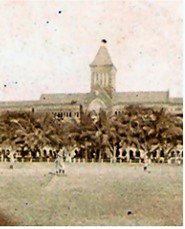
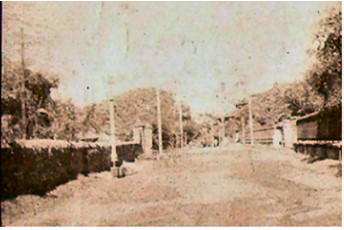

While we were living in the lap of luxury, the young men of our nation were being slaughtered in France and the people in England were on hard rations. I think we all had a guilt complex about this, but we couldn’t do a thing about it. It was just the way the dice had fallen.
Concerts were held in the dining hall, and I was drawn in as ‘props’ and ‘noises off’. We had quite a lot of talent: a top line London comedian, a lightning sketch artist, some trained singers, pianists and violinists. I had no talent for show business, but occasionally took part as an extra or as one of the chorus. The London comedian who was called, say, ‘Billy Barnes’ got hold of the script of a review, ‘Who’s Who’. Some said he had pinched it from an officer in the mental ward.
Anyway, it was decided to produce it and put it on in the Bombay Town Hall. Proceeds were in aid of RAMC prisoners of war. Billy Barnes was excused duty to organise the affair, all expenses paid. One of the expenses was a bottle of whiskey a day. There is no doubt he worked very hard. Where the money came from, I don’t know, but everything was laid on.
Half a dozen of us youngsters were pulled in to act as ‘chorus girls’. We had little to do except link arms at the back of the stage and swing our legs and sing the choruses. We had a lot of fun at rehearsals. The costuming was gorgeous. We had several changes. One was a harem dress: yellow silk pantaloons, blue silk tunic, a gorgeous golden tiara, with glass jewels all over it – diamonds, emeralds, rubies, and what have you. I took this costume home with me and it was in great demand for fancy dress carnivals until someone ‘forgot’ to return it and I lost it in the end.
Then came the great day. Somebody had been very busy selling tickets and, when we peeped through the curtain, the hall was packed with evening dresses and dinner suits, with half a dozen staff officers in the front row. Billy Barnes was sweating like a pig and lapping up his bottle of whiskey. He had to sing a song ‘I’m on the staff’. He was resplendent in officer’s uniform, red tabs on the lapels and a red band round his hat and rows of medal ribbons.
I’m on the staff, I’m on the staff; I’m on the staff, Upon my word I really have to laugh, With some red stuck round my hat, I’ll attend to this and that At a salary I’ve never drawn before, Is as easy as can be, as you can plainly see, And you’ll never catch me working anymore
Chorus: He’s on the staff, etc., I shall saunter down the office, Say from two till half past three, There’ll be four and twenty lady clerks, Who’ll all attend to me, And the nicest of the lot‘ Will put the sugar in my tea
Chorus: I shall motor down to Poona, Cos of petrol I’ve enough, I often get so much I chuck away the beastly stuff‘ And no one says a word, If I should take a bit of fluff.
That’s the gist of it anyway. I confess I watched the staff officers with some trepidation, but they laughed with the rest and seemed to enjoy it. Billy sang more songs and, of course, was the star of the show.
There was a plot in the review; something to do with mistaken identity, but it’s too long ago to remember everything. The show went like a sewing machine and we were invited to do it again but something went wrong; Billy had been misappropriating the funds. There was nothing done about it, but Billy was sent on draft and we saw no more of him. The concert party kept going, and we gave concerts at a Jewish Synagogue and at the Sailors Home among other places.
Four of us were pals together, and every night we emptied our pockets of small change and put it in a bag. At the end of the month we received an extra pay and, with our savings, it was enough for a night out. The concert party had accumulated quite a few civilian suits so we decided to have a night out in ‘mufti’ just for kicks.33 We sorted the suits out and took them down to the laundry and hid them behind the baskets. After dark, we went down to the laundry and put them on. This was taking a risk, as any soldier caught in civilian dress was classed as a deserter.
We hired a gharry and off we went to Monogenies.34 We had a slap up dinner with liquors and wine. I noticed people looking at us, maybe they thought we were seamen and resented us. It was a posh place; anyway, we had a good time, sneaked back to the laundry, changed and went to the barracks the back way. We had no late passes.
The private soldier in India was classed as an outsider and notices saying, ‘Officers and Civilians Only’ were quite common, but the civilian army was gradually breaking that down. In the RAMC, we had chemists, dispensers, pathologists, x-ray operators, teachers, artists, masseurs, sanitary inspectors and a lot of semi-professional people. Preston, who was in the concert party and had an Oxford accent, had as his civilian occupation ‘scholar’. Quite a lot of them had private means.
I was working in the dining hall for a long time and had quite a lot of different mates. At one time I had two mates, Barraclough and Kay. Barraclough was a pianist and often played for us as the piano was in the dining hall. He was about 36 and Kay about 40. They were too old for me, but they went out together. One day Kay said he was reporting sick, and when he had gone Barraclough said he didn’t feel too good either, so I got him some soda water. Then someone came for him. He had to report to the doctor. While they were questioning him about their movements, he collapsed. It was the dreaded Cholera – consternation! Everybody was questioned, tested and inoculated. They were looking at me and saying, ‘You next’. They had been out together the night before and had probably picked up the germ in some native café. Cafés were placed out-of-bounds and uncooked fruit had not to be eaten. During their investigations, they found a carrier, the head native cook in the Officers’ Mess. They also found that he had been selling their tinned goods. He was sent away somewhere.
The very next day both men were dead! Wasted away, absolutely dehydrated. They had a proper military funeral with a Union Jack and a firing party. I attended the funeral. The firing party fired a salute and the bugler sounded the Last Post and we marched away. As soon as we were out of sight of the cemetery, we started to sing marching songs. Most of the men had been on some battlefront and the death of a soldier was ‘kismet’.
Eventually I had to go on the wards and decided to make the best of it. The Indians looked after the meals and the cleaning. The sisters just supervised and we did the nursing: dressings, bed washings, taking blood slides etc. It was a general ward, and we had all kinds of cases. Once we had two dysentery cases that were being treated with emetine hypodermic injections. I had to prepare the syringe; two tiny tablets melted in a tablespoon of hot water and sucked into the hypodermic ready for the doctor, who did the injection. Sometime after this, the patients complained of feeling queer. I rushed to the hypodermic case and found – morphine! I told the sister. She said, ‘I’ll fix it – but on second thoughts, better get the doctor’. I found him in the next ward. I told him and he said, ‘Get me some atropine’. I quickly got some and he injected it to counteract the morphine. I must have been looking worried. He said, ‘Don’t worry. They will be all right now, but that will teach you to read what is on the bottle before administering anything’. But I was still worried and haunted the ward for the next twelve hours, until they came out of it.
We found out that someone from the next ward had borrowed the syringe during the night, to give a patient morphine, and had put the morphine back in the case instead of the emetine. I told the patients about it when they woke up and neither bore me any ill will. They soon got well and were discharged. I made friends with one of them. He belonged to the Royal Garrison Artillery, which was stationed nearby. I often saw him in our canteen having supper. Another time, I put a steriliser on the gas jet just before I went off duty. The instruments had to boil at least twenty minutes. I handed over to my relief, and I don’t know whether I told him about the steriliser or not, but it boiled dry and the beautiful chrome plated steriliser was ruined. They didn’t know who to blame for this, so nothing was said about it – worse things happen at sea.
I wasn’t always making mistakes and I got along all right with the sisters and doctors. All the sisters were Australians and weren’t as rank conscious as the English sisters. We had a Eurasian patient with Beriberi. You could push your finger into his leg and the indent would stay for quite a while, like a punctured rubber ball. The doctor said, ‘It’s just snobbery. He has been living on polished rice instead of the unpolished rice, which the natives eat’. Beriberi is evidently a vitamin deficiency disease. They put leeches on his legs. The leeches dropped off when they were about ten times their original size and we put them in a bottle and took them back to the lab. I think this was an old-fashioned treatment, even for those days.
Sometime later, I was isolated with two other men, both of whom had been orderlies in a mental hospital in civil life. The patient had Cerebrospinal Meningitis. We had to wear long white gowns and gauze masks over our faces. The patient had never to be left. I think we did four-hour shifts. We had a whole top storey ward to ourselves. We slept in a little annex room. Major Hammel and Major Mac, who were both Harley Street specialists in civilian life, came to examine him. When they had finished, Major Mac turned at the top of the stairs and fired a list of things he wanted ready for his return. I managed to remember everything and had a tray ready when they came back. They had with them a young captain, probably straight from the medical school, who had to do the operation. They chloroformed the patient and I had to turn him on his side, put one arm around his neck and the other one round the back of his knees, and double him up. The young doctor started to probe. Major Hammel said, ‘Damn it man, can’t you find the fifth lumbar vertebrae’? (I’m not supposed to tell these things but they will all be dead now.) Eventually he got the big needle in and ran some fluid off the patient’s back, and then they pumped some anti-serum into his back. This went on for a week or more. At the end of the week, it was taking twenty minutes to put him under chloroform, but he started to improve. He had been semi-conscious for a week, but was now awake and free of the disease and taking nourishment. He was a very handsome man with Grecian profile and golden curls. The sisters made a great fuss of him, bringing him chocolates and cigars, but he died suddenly about a week later. The disease had left him with a weak heart. This disease always had some serious after-effects.
Sometime after this I was informed that I had £15 credit in my pay book, and that I could take a month’s leave. My mates said, ‘What are you going to do?’ I said I had no one to go with. They told me that Sergeant Phillips was going on leave. This was the sergeant of the mule cart episode on Gallipoli. He said he would be glad of a companion and that he was going to Mussoorie in the foothills of the Himalayas.
We had a first class compartment with bathroom and had it to ourselves for 150 miles or so. Then two civilians got in. They had been on a shooting trip, and their bearers were loading deer of some kind into the guard’s van. They offered us whiskey but I had never had spirits, so I settled for a glass of beer. They started to question us about diseases and cures, thinking that the medical corps ought to know all about it. They left us after a while, and we got some Indians who sat on the seats in the Buddha posture. They hadn’t much to say, and soon we arrived at Delhi, where we decided to break our journey. As soon as we got out of the train a porter grabbed our bags, put them into a gharry and shouted the name of some hotel. I suppose he would get commission for that. We were shown to our room, and they brought us something to eat. A man came in and said he was a guide, so we engaged him for 9 am the following morning. At 8am we went to the dining room; the sergeant said a loud ‘Good morning’. They all looked up and mumbled something. I got the impression they didn’t like common soldiers. We had our breakfast, and soon were on our way to see the sights. We passed through the Delhi Gate, which had been left in the condition it was after the Mutiny with some of the masonry shot away. Soon after we left the Gate we were shown a cellar grating from which General Nicholson was shot. His blood stained coat was in a small museum nearby, among other relics of the mutiny.
We went on to see tombs, palaces and temples. Most of the tombs were quite big buildings, with the actual tomb in the middle. On one of the tombs was a marble vase with a lid on, the knob of the lid was supposed to have held the famous diamond, the Koh-i-Noor at one time. I took a photo of the sergeant looking at it. We went to the Juma-Musjid, a big mosque. They didn’t ask us to take our boots off, but gave us big canvas overshoes so we wouldn’t defile the place. The floor was tiled with oblongs, about four feet by two feet, just enough space for one man to do his obeisance in. These oblongs were decorated with geometrical designs and curlicues. The Muslims abhor any graven image.
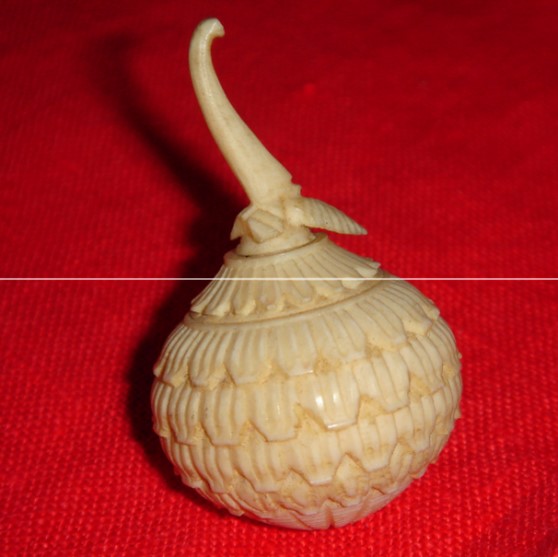
ivory carver to take home to his sister Emily.
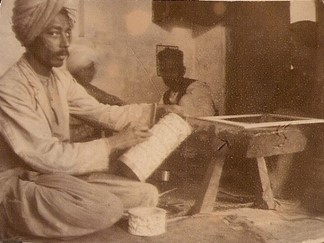
taken by Bill when he was in India.
From there we went to a shop where they sold carved ivory: a bridge of elephants carved from a full tusk starting off with a tiny elephant and finishing up with a much larger one at the butt end; a series of ivory balls, one inside the other, all carved; ivory and ebony screens that must have been worth a lot of money. I bought, for a few rupees, a carved ivory custard apple; the stem and leaf screwed out, and the inside was hollowed out, for perfume I think. I gave this to my sister and she eventually gave it to my daughter Anne.
From there we went to the Delhi Fort. The Fort had a twenty-foot high red sandstone wall and a huge gateway with a life-size stone elephant on each side. Inside were half a dozen palaces: a big one for the Rajah, smaller ones for his many wives, and a beautiful white marble mosque. In one room was an eight-foot square bath, made from yellow translucent stone. Some of the decorations were inlaid with semi-precious stones, and, in some places, vandals had prised them out.
Back to the hotel and off to Agra in the morning. When we stopped at some of the stations, monkeys clambered onto the roofs of the carriages and down to the windows, begging for food. They did very well, as monkeys are sacred to many Indians. They had enough sense to get off the train when it started. India had a lot of people, but there was still plenty of room. We went through a lot of empty country, from jungle to semi-desert.
When we arrived at Agra, it was another hotel, another guide and another tour of tombs and palaces until we got sick of them. We wanted to see the Taj. The guide said, ‘If I show you the Taj first, the others are nothing’. So the Taj Mahal was last.
On the bank of the river Jumna stands that dream in marble, the Taj Mahal, erected by Shah Jehan as the tomb for his favourite wife, Mumtaz Mahal. It is often extolled as the most perfect work of human hands. Built of white marble and inlaid with coloured marbles from all over the world, it took thousands of workmen seventeen years to build. I wouldn’t like to estimate the cost. Inside the building is a tomb, surrounded by a marble screen. The guide gave us a demonstration of the building’s acoustics by calling, ‘Allah-il-Allah’, and the sound rumbled around the dome. He then told us that this was only the false tomb, built to foil robbers, and that the real tomb was in the basement. So down we went. Here were the keepers of the tomb. The tomb was covered with a purple velvet cloth, and beside it a tray with a few silver rupees on it – a very broad hint. We thought that for soldiers it ought to be half price, so we gave them eight annas. They took off the cloth and pointed to a marguerite-like flower, which could have been covered by a fifty-cent piece; it consisted of thirty-two pieces of coloured marble.
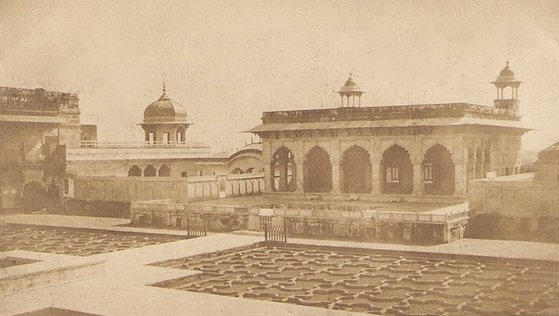
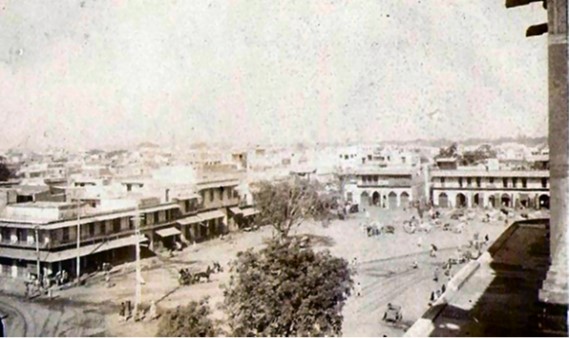
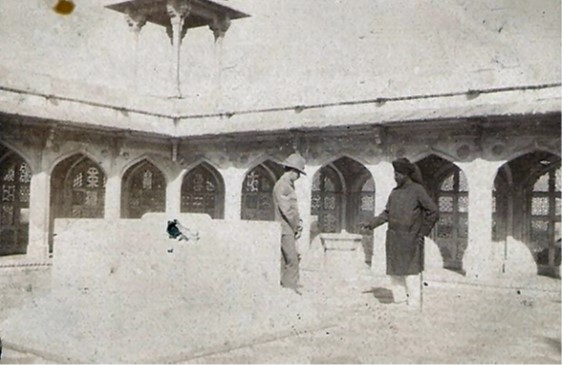
The next stage was to a place called Muttra which is a cavalry station in the desert.35 Two of our men from Colaba had joined a cavalry regiment for seven years. One of them was in hospital, so we didn’t see him, but the other one told us that he had won his spurs by proficiency in riding, and that he had a lot more training to do before he got his Sword and Lance. There are no more cavalry regiments now; they have all been made into Tank Corps.
On once more to Derra Dun, the railway terminus, as from here the land rose in ever-increasing height all the way to the Himalayas.36 We procured horses here and the sergeant galloped off, with me after him. I soon pulled up to a walk as I had never been on a horse before, but walking was fast enough, as soon the road became steep and winding. I think it must have taken a couple of hours to get to Mussourie.
The horse boy was there before us; he must have taken a lot of shortcuts. We handed over the horses and climbed about twenty steps to the house. Our host held out his hand to welcome us, and I let him pull me up the last two steps. I thought I must be getting weak; I didn’t realise that it was the rarefied air at seven thousand feet. We spent some time looking at the views, had a late dinner and went to bed. I was awakened during the night by pitter-patter on the roof and some kind of coughing noise. There was a hole about two feet square in the door for ventilation, so I didn’t feel too easy for a while, but went off to sleep again.
The place we were in was called the Soldiers Home, and the man in charge was an ex sergeant major. He had a wife and two little girls. I asked him about the noises of the night. He said the patter on the roof would be monkeys and the coughing noise would be barking deer. He also told me that the district held the record for a leopard, I think it was, and that when the postman was missing, they found him bailed up under a culvert by an elephant.
The next day, we purchased sticks, which were about four feet long, beautifully tapered and varnished with a knob on top and sharp iron spike on the bottom, to help us to climb the steep tracks. We planned to view the Himalayas from a place called Landi-something, another two thousand feet up – a total of nine thousand feet. We started early one morning, and were told that we would be lucky if we saw them as they were often clouded over. But we were lucky, and there they were forty or fifty miles of them, thrust up into the sky like jumbled ice blocks. The view was well worth the climb.
This village was very primitive, and the people had a distinct Mongolian cast of features. I had noticed the change of features all the way from southern India: very dark in the south, lighter and with European features in mid India, hook noses and proud bearing in the north and this Tibetan look in the mountains.

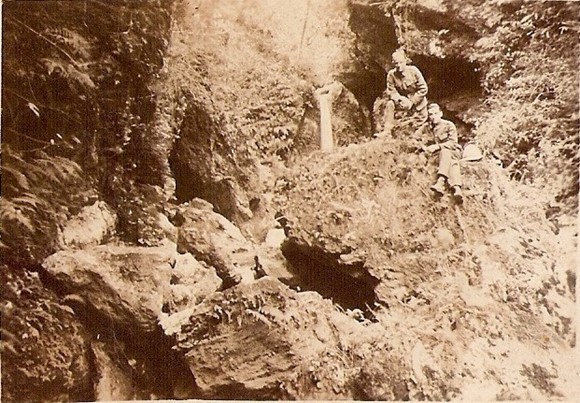
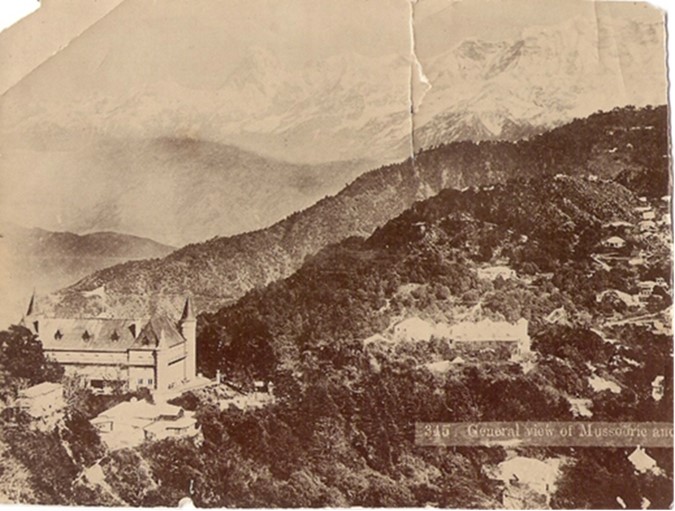
One day some of the residents went to play tennis. The courts were a couple of miles away. I didn’t play tennis, so I watched them for a while and then went to explore the surrounding jungle. It started to go dark, and when I got back to the tennis courts they had all gone. I started off after them. It got darker and the jungle started to awake. With visions of leopards and elephants, I hurried on. When I came to where the houses were, I was hailed from the veranda of a house on the mountainside by a man who was as drunk as a lord. I could scarcely tell what he said, but I gathered that he wanted me to go and have a drink. He was alone and probably lonely.
I would have finished up worse than him, as I wasn’t used to strong drink, so I declined the invitation and he abused me. There were very few people in Mussoorie, as it was winter in the northern hemisphere. Mussoorie filled up in summer when it got very hot in India.
Another day, we went down in a valley to view a waterfall. While we were there, a party came down: three or four women and some young men. They invited us to share their lunch. One of the women was seated in a kind of carrying chair and she was surrounded by half a dozen dogs of different breeds. She was telling me that each one had a pedigree as long as its tail. I nodded and smiled but I had to look up ‘pedigree’ later as it was a new one on me.
Our holiday came to an end, and one day the boy arrived with the horses. I declined the ride as I remembered my sore behind from the ride up. I said I would go down with the boy. No wonder he had beaten us on the way up. He ignored the roads and went straight down through the jungle. About half way down the boy pointed up a big tree to a monkey. It was as big as the twelve year old boy and had white fur round its face. Unthinking, I went to pick up a stone and the boy protested, ‘Arri Barbary Sahib’, meaning it could be a savage brute. So, when it started to chatter at us, we went on our way. We arrived at Dera Dun before the sergeant.
On our way we stopped off at various stations, and at one place we saw carts piled up with silkworm cocoons. They were dribbling off as the carts lumbered along the road. Another place, we saw people extracting the oil from castor oil seeds. The device consisted of a big wooden cup about three foot six inches high. Down into the cup was a log of wood with a long wooden pole attached to it. Two bullocks were harnessed to the pole and, as the bullocks pulled the arm around, the log crushed the seeds against the sides of the cup.
So we got back to Colaba. We worked a kind of shift work. Day shift was 8am till 2pm, a short shift, as this was when all the work was done. Afternoon shift was 2pm until twelve midnight and night shift was midnight until 8am. So when we were on day work we had most of the evening to ourselves. This was when we went out, mostly to the city.
I remember being downtown one day watching some entertainers. A boy was walking a tightrope with bullocks horns attached to his feet. This seemed much more difficult than in bare feet. Then I noticed a native woman, standing, obviously begging. She had a baby and one could see the ribs of both of them. I felt sorry for them so I gave her a rupee. This was evidently a windfall; she turned round and rushed off. I often wondered if some drunken husband was waiting for her and grabbed the money.
A mate once asked me if I would do a shift for him on the mental ward, only for a couple of hours, while he played in an important football match. He said the bad ones were locked up and only the harmless ones were on the wired-in veranda. ‘Humour them’, says he. One of the inmates asked me to write a letter for him. It was all about his brother who was stationed on Butchers Island, in the harbour, and who was to be hanged in the morning. He forgot to tell me who to address it to. Then I heard someone singing. I looked through the wire door to see a man standing on the table singing, ‘God Save the King’. He was putting everything he had into it. I was glad when my mate got back.
I was once put to guard some Turkish prisoners, but guard is hardly the word. They were in pyjamas in hospital beds with hospital food and thousands of miles from their homeland, so I couldn’t see them trying to escape. One of them took off his coat and showed me his scarred body. He was trying to tell me about it, but all I could make out was ‘metrilluse’, which I took to mean ‘machine gun’. The matron came round with the Colonel and she was evidently a linguist as she tried them with three or four different languages, but she got no response.
By this time, I had done a fair amount of travelling, but had only been able to tell of things that had happened to me. I had some knowledge of geography, this having been my favourite subject at school. I had a little knowledge of English history, but nothing of world history. How much more interesting would my travels have been if I’d had some knowledge of the history of the places I had been to? I knew nothing of botany, geology or zoology. Some people say a little knowledge is a dangerous thing and I realise that these subjects are so vast that to become an authority on any of them, one would have to specialise. But to have some knowledge of these subjects would make a walk in the bush much more interesting: to be able to name the trees and shrubs and flowers and to pick up a rock and know something about it; to recognise animals and know why they live in that particular place; to look up into the sky and be able to name the different cloud formations; and at night to recognise the constellations and to name at least the navigation stars. A microscope, or even a magnifying glass, will reveal another world, and make us realise what a wonderful place we live in. Some knowledge of philosophy and psychology would have enlarged my understanding of the many diverse personalities I had met. One can get some knowledge of these subjects from books. Today the public libraries offer a wide range of books on almost any subject, which is a great boon to anyone who has not had the opportunity of higher education.
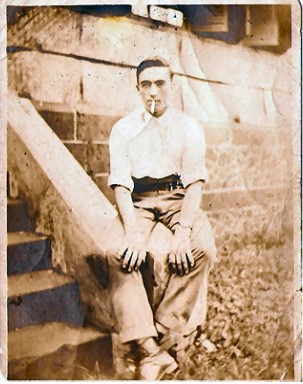
1916 – 1917
Back to India… The sergeant major invited all those men who were off duty to take a trip around the Harbour with him. About twenty men boarded a small steamboat and proceeded to Elephanta Island in Bombay Harbour. The boat landed at the end of a stone jetty, which was composed of stepping-stones about a yard apart. Negotiating these would have been easy in bare feet, but was a bit tricky in boots. The object of the visit was the Elephanta Caves. There was quite a large entrance, thirty feet wide and about ten feet high. Inside was a series of high caverns with carvings of all the Hindi Gods, ten and twelve feet high: Krishna, Ganupathy, Hanuman, Kali and even some Buddhas. The guide told us that the whole lot was carved by three brothers in three days and three nights, which was a bit much to swallow; thirty years would have been nearer the mark. Hindus are supposed to tolerate all religions, as all lead to the same ends. This toleration by the Hindus didn’t extend to Muslims, we sometimes had to ‘stand to’ because of Hindi/Moslem riots, but we were never called out as the police and the native hospitals always seemed to cope. In the village of Elephanta we saw some cottage industries; carpet making among others.
Sometime later, I entrusted a parcel to a man who was going to England on six months compassionate leave for some family trouble. He told me how much safer the parcel would be in his keeping than in the post. He would post it to Lancashire when he got to London. In the parcel was ₤15 in notes and all my souvenirs, including the beads I had bought from the ploughman, a small replica of a Ghurkha’s Kukri (knife) and a brass Turkish shell nose, which had Turkish figuring on the time bands, and which weighed about three pounds. I had carried it all the way from Gallipoli. When he came back, about six months later, he had a story about becoming sick on the boat and being put ashore at Cape Town, and how he had entrusted my parcel and one of his own to the captain of the ship to post in London, and he knew no more about it. How plausible was he; how gullible was I. I think he stole my parcel. He certainly destroyed some of my faith in human nature. I can imagine my shell nose, polished up and mounted on a piece of mahogany, gracing some mantlepiece in London, and what a wonderful story he would be able to tell of how it came into his possession.
I remember going to the city one night, to see a play. I think it was called ‘The Girl in the Train’. As we approached the box office a man came to us and said we could go in for nothing if we would take part in the first act. So we went round to the stage door. The scene in the first act was in a courtroom and we were supposed to be clerks of the court. They rigged us up in long black gowns with something on our heads; I forget now whether it was a wig or a hat. We had to sit behind a bench, and pretend to be writing, and when the judge asked for a model of the train, to hand up a toy train. That was all. It was very interesting to be on that side of the footlights, and I was amazed at the talking that went on sotto voce in between the lines of the play. I heard an actor near me say to his companion, ‘I see the Mrs So and So is here again tonight; that’s the third time this week. I wonder what she’s after?’ We saw the other two acts from the other side of the footlights. It spoiled the play for us, but I didn’t begrudge that, as it was a very interesting experience.
As soldiers, we kept very much to ourselves, and I often regret that I didn’t take more interest in the natives and their way of life. I have no doubt that a lot of British people made a lot of money out of India, but they did some good – building roads and railways, bridges and dams, and suppressing some of the evil ways of native life. One instance is the outlawing of suttee, the practice of widows having to incinerate themselves on their husband’s funeral pyres.
The war finished on the 11 November 1918. I was in hospital with tonsillitis. I remember half a dozen of us patients talking quietly in the dusk. None of us were jubilant about it, but we had a feeling of relief that the slaughter was over.
It was hard to settle down to anything then; we were just waiting for a ship to take us home. But it was the beginning of April 1919, before anything happened. Then a group of us were sent to Deolali. There is a saying in India, ‘He had the Deolali Tap’, madness, heatstroke, and no wonder.37 Deolali was a hot place of rocks and sand and cactus. We had several whirlwinds while we were there, taking up into the sky blankets, papers, sand and even a tent in one case, with the kite hawks flying around them whistling. These kite hawks are the scavengers of India. When we were coming away from the mess room with our half loaf of bread we had to tuck them under our arms, or the kite hawks would knock them from our hands and the next one would swoop and pick it up off the ground and there goes the daily ration of bread. We used to throw any leftover bones up into the air and the hawks would catch them on the wing. After about ten days at Deolali it was back to Bombay.
Afterthoughts about India
I got friendly with a man from the Royal Garrison artillery. He was an MA (Manchester University), and a very nice man. He told me a story. He was sitting on a form, on the seafront at a place known as Back Bay. He was reading. A civilian came and sat near him. After a little while, the civilian said, ‘Excuse me, but isn’t that rather deep reading for a private soldier?’ So they got into a conversation. The civilian said, ‘Come over to my place and have a drink’. ‘OK’ he said. It was one of the big places across the road. Intellectual conversation and good wine in a luxurious lounge room. Everything was going fine till the civilian made a certain suggestion. My friend hauled off and knocked him for a sixer and walked out!
I had a similar experience. I was sitting on the windowsill of the billiard room, watching the play, when a young man got talking to me. He said, ‘What about coming to the pictures?’ I said, ‘I’m flat broke’. Says he, ‘That’s all right I’ll foot the bill.’ I knew him slightly as ‘Frenchie’. He was supposed to be half French, half English. So he got a gharry, and off we went to the cinema. If our conversation had been recorded the Archbishop of Canterbury couldn’t have picked anything out of it, but certain leanings and pawings made me feel very uneasy. So I suddenly developed a terrific headache, and was afraid I was going to have a bout of Malaria. I’d have to get back to the barrack room even if I had to walk all the way. He got a gharry and I arrived back at the barracks safely. I hurried to my corner of the room. All my mates seemed to be busy, patting pillows and looking into lockers, all except Crawely. Crawely was looking at me with a twinkle in his eye and was shaking with suppressed laughter.
‘You #@% and %$#. Why didn’t you tell me?’ It seemed everybody knew except me. But how was I to know?
There is a sequel to this story. When the armistice was signed we were invited to join up for another three years, with a twenty pound bonus. There was also a call for suitable young men to be officers in the Indian Army. Frenchie put in and was accepted and, some months later, he came back to Colaba to show himself. I viewed him from afar. He was resplendent in jodhpurs, Sam Brown belt, gleaming brown boots and leggings, red tabs on his lapels and a red band round his hat. He was evidently on the staff of some Rajah. Frenchy had found his niche at last.
One day I was walking along the veranda when Corporal Eddows’ monkey bit me. I had never harmed it; I think it was a case of mistaken identity. It bit me on the calf and it hurt. That monkey never knew how near he came to a swift kick in the ribs. Poor Bingo, he later climbed an electricity pole, grabbed the wires and fell to the ground electrocuted.
When the Spotted Fever patient was recovering someone brought him a small bottle of champagne, but he never got around to drinking it. About a week later, the sister found it in the cupboard. ‘Whoever put champagne away like that? It should be stored upside down. Take it away and pour it down the sink’. It was certainly flat, but it tasted all right. I put two tablespoons of sugar in it and shook it up and drank the lot. I floated through the rest of the shift.
Our officers were doctors, and most of them weren’t a bit military. So we put away our grey black shirts and our heavy boots and acquired shoes and white shirts. I took charge of the dirty linen and, when counting them, jumped one when in the teens, so that forty nine dirty sheets became fifty laundered ones. When putting them away in the linen cupboard, I would select the very best and take it to the Mohammedan darzees (tailors), after tearing off the hospital brand in the corner. There would be half a dozen of them sitting round a hookah, the bowl of which must have held at least half a pound of tobacco; they passed around the flexible tube smoking in their turns. ‘Make me a shirt out of this’. ‘Esheet Sahib?’ (they had trouble with their esses), ‘Never you mind. Make me a shirt.’ Soon I had seven white shirts.
It was a hot day. All of those off duty were lying about in various stages of undress, some reading and some playing cards. We had no chairs, so they were sitting or lying on the beds. An old English gentleman with a white beard came into the barrack room with an armful of magazines and started to distribute them. Silence, then, ‘Thank you, thank you’. The old gent thought he was in a hospital ward. All went well, until he came to Peter. Peter was asleep, flat on his back and stark naked as usual. The old gent was visibly taken aback. Open-mouthed, he looked round the room, dropped his magazines and hurried from the room. Loud and prolonged laughter followed!
If I remember correctly, we paid one rupee a month to the dhobie (washerman) and you could send as many articles as you liked. After bashing the clothes on the rocks they were laid out on the sand to dry, and then they were ironed with a huge smoothing iron with a charcoal fire inside. The women used to do this job and it must have been hard work. I guess the iron must have weighed about five pounds. The dhobies never asked our names. One was known by a dhobie mark, a kind of Morse code, dots and dashes, mine was ‘.i.’, and I have often used this as a secret mark on my belongings.
They never made mistakes and washing was returned, ironed, and neatly folded, a few days later. When the clothes were laid out on the sand they must have picked up some germ or mould, and this gave us ‘dhobies itch’. I think it was something like Tinea. Anyhow it itched and we scratched. After a while it became raw and burning. It attacked us mostly on the inside of the thighs and, if you left it too long, it would go as far down as the knees. The recognised cure for this was Tincture of Iodine, painted on. This was a drastic cure, one had to grit one’s teeth and walk up and down the barrack room, fanning the place with the shirt flap, but it cured it.
Sometimes we got Prickly Heat; this was inflammation of the pores from excessive perspiration. I don’t remember what we did for this. It was very uncomfortable especially after drinking a hot cup of tea. I remember having sore feet. I was limping around. Sister said, ‘What’s the matter?’ I said, ‘Sore feet’. Says the sister, ‘What do you do for the patients to prevent bed sores?’ I said, ‘Rub them with methylated spirits and then talcum powder’. Well, of course, why didn’t I think of that myself?
Once, when I was in a terrific hurry about something, I forget what, I dashed into the barrack room and saw a group of men standing around a bed. My curiosity aroused, I peeped over their shoulders to see a scorpion on the bed, and what a scorpion. If it had been stretched out it must have been seven or eight inches long, but its tail curled over its back, ending in a wicked looking claw, half an inch long, and it was menacing. I was in a hurry about something and didn’t see the outcome, but I guess that scorpion came to a very sticky end.
Do you remember me telling you about finding a ripe tomato patch? I stuffed my shirt with ripe tomatoes and wandered on. I came to a well. These wells were all over India, generally about twenty to thirty feet in diameter, and deep. They are lined with big blocked masonry and most of them are very old. In this one the water was about fifteen feet down and, halfway down, a bush was growing from a nick in the masonry, and on the bush was coiled a black snake. It was about three inches thick in the middle and I think about ten or twelve feet long. Of course I had to throw a stone at it. It uncoiled and flopped into the water, a wriggly swim to the other side of the well and down into the depths. I don’t know whether the snake drowned, or whether a snake can stay a long time underwater foxing. I got tired of waiting and wandered on.
Reading back over my writing about India, I suspect that times and places and events are out of chronological order, and I find that I have missed out altogether one of the places I was stationed at. It was at Bangalore, a regular peacetime station with married quarters, parade grounds, drill halls and a really good gymnasium, with every gymnastic device one could think of. We were living in the old married quarters: three or four beds in the living room; a couple in each bedroom and an odd one in what had been the kitchen.
The odd man living in the kitchen was called Burden. He was a very quiet man who was always reading. He went to church every Sunday and didn’t seem to have any intimate friends. He was very pale and sickly looking and didn’t seem to be very healthy. One day we were discussing the gymnasium and boxing and wrestling and health and strength in general. Burden must have been listening, and after a while came into the living room and joined in the discussion. He came over to me and tested my belt, then hoisted me up over his head three times, without any great effort. Then he took off his shirt and did a few poses. He was like the village blacksmith, ‘The muscles of his brawny arms stood out like iron bands’.38 I weighed about nine stone at the time. After that Burden went back into his shell, but ever after was treated with respect. I don’t think anyone would have picked a fight with him.
One day a mixed race gentleman came into the room; he was a tattoo artist. He had a book full of colourful designs. Quite a few of the men decided to be tattooed. When he had finished them my mates said, ‘Come on Bill you next’. ‘No!’ ‘What’s the matter with you, frightened of the prick of a needle; aren’t you game?’ A youngster of nineteen shouldn’t be dared to do anything and I had to try everything once. So I selected a design of Allied Flags and had it tattooed on my upper arm, more or less out of sight, thank goodness! A long time after that I went into a room at Colaba Hospital. Three sisters were in there gossiping. I had to reach up to a high shelf and my rolled up sleeve fell down and disclosed the tattoo. A horrified, ‘Oh, Mercer’. Evidently they thought that tattoos were only for New Guinea savages.
The half-caste patient who had Beriberi told me that if I wanted to have a bit of fun, to address the old man as father-in-law, and told me the words. The old man in question was a dignified old wardsman with a white beard. So I walked over to the old man and addressed him as I had been told. He turned round drew a deep breath, his eyes opened with indignation and gave me a blast in Hindustani so loud and fast that I didn’t understand a word of it. I knew then that father-in-law had further implications in Hindustani, but I think the old man was wise enough to guess that someone had put me up to it.
Travelling home from India
After about ten days at Deolali we were back to Bombay, and on board a ship. I forget the name of the ship. We had several burials at sea as most of the men were only in C3 condition. In the middle of the Indian Ocean a native Indian fireman came up from below, and dived overboard. ‘Man overboard!’ Several crew members dived in, and the ship turned in a circle to come back to the place where he had gone overboard. There seemed to be a race between the British part of the crew and the lascars.43 It was now going dark and we couldn’t see what was going on, but after a while the British crew arrived back with the man. They said that the sharks were circling him when they got to him. The troops were giving him a cheer, when a loud voice came from the bridge, ‘Put that man in irons’, and that was the end of that episode. The poor man had probably been driven mad by the heat in the stokehold.
Now we travelled up the Red Sea and it was hot. There was no air conditioning in those days. Through the Suez Canal and along the Mediterranean to call at Marseilles. The troops were confined to the ship, but this didn’t suit some of the hotheads. They said the war was over and they had had enough discipline, so a mob charged down the gangway, bowled over the officer at the bottom of the gangway, not too gently either, and set off to town. This must have alarmed the officers, so they paraded us and we had to route march round the town.
There was a railway marshalling yard near the docks and I noticed that the lines were packed with German rolling stock; there must have been hundreds of wagons and vans. Marseilles struck me as a very grubby sort of place, and that was all I ever saw of France.
Personalities
The Cliff Brothers
After the flood on Gallipoli I got myself some new mates. I found a dugout with only three men in it. I don’t remember being asked, or asking, to come into the dugout. I kind of just drifted in. One was just a youngster like myself and the other two were brothers – the Cliff brothers. They were only about twenty, probably twins as they both looked the same age and they were very much alike. They were small men, but broad, what we used to call ‘nuggets’. They were do-it-yourself fiends and the dugout was full of gadgets. One was a rifle oil tin fitted with a wick. The oil burned with a yellow flame and smoked and stank, but it was very useful for lighting cigarettes and gave a little illumination to the place. They had shelves cut into the sides of the dugout; a place for rations, another for mess tins and cutlery and so on, and everything in its place.
They had appointed themselves as cooks. The army biscuits were about four by three inches, half an inch thick and as hard as a rock. They seemed to be made of wholemeal with pieces of what looked like dried meat in them. The Cliff brothers knew how to deal with them. They used to soak them in water overnight and they would swell to twice their size. For breakfast they would fry them with the bacon and perhaps a little cheese – not bad. When cooking, they would be fluttering around and chatting to each other like a couple of sparrows. Of course I used to do my share of the work, chopping boxwood for the fire with a bayonet and cleaning out the dugout. You would have thought we were on a camping out picnic. Never in my wanderings did I come across two civilians more dedicated to becoming real soldiers than the Cliff brothers. When on parade and called to attention the brothers would spring to it. Just like the sergeants at Aldershot had taught us; head erect, eyes front, chin in, shoulders back, hand in line with the seams of the trousers, toes at an angle of forty five degrees and as stiff as ramrods. They were very patriotic and I am quite sure that both of them would, quite willingly, have laid down their lives for King and Country. I lost them later. Whenever we moved to a fresh place the sergeants would come along and cut off twelve men to a marquee, eight men to a tent, four men to a dugout, and one could finish up with a fresh set of men altogether.
Captain Glen
Being in the Bearer section, we had very little contact with the other officers of the Field Ambulance, but Captain Glen was ‘our’ captain. Of course, he was a doctor. He was tall and distinguished looking, but a very shy man; I think he was a stutterer. When he addressed us he spoke very much like King George VI, with long pauses between each sentence as though he was summoning up for his next sentence. He would look down and scrape the dust with his boot. He seemed to be embarrassed. But we loved him! Why? Because he shared our hardships, he had no special privileges and when we laid down in the dust and dirt he would lie alongside of us. We would have followed him anywhere. Years later someone told me that the Captain had been drafted to East Africa and while there had suffered a mental breakdown. I hope it wasn’t true.
Staff Sergeant – What?
I remember him very well, but forget his name. I think he was an Irishman and he was a big tough looking man. Whenever we laid down for a rest he would take the chair and address the company. He had a saying, ‘When yous is on parade, yous is on parade and yous does as I tells yous, but when yous is off parade yous is my best pals’. When we got to Mesopotamia he became a kind of free-hand, and used to wander around the front line trenches. Some of the men said he was looking for a medal, perhaps a VC. I don’t know whether he ever got a medal or not but I’m sure he was quite fearless.
Sergeant Phillips and Corporal Eddows
I don’t know whether these two men followed me around or whether I followed them around, Gallipoli, Mesopotamia, India, but we all finished up at Colaba War Hospital. I came into contact with Sergeant Phillips quite a lot in our work at the hospital and sometimes I was a bit cheeky to him, but he wasn’t a vindictive man. We went on a month’s leave together and travelled the length of India, and we got along all right. Naturally, we did a lot of talking in a month. But he never told me anything about his civil life. He was tall and dark and had a little film star moustache. He was always very proper and never swore. I often tried to sum him up and plumped for him being a gentleman farmer. He seemed to know a lot about the land and rode a horse very well, but I couldn’t see him milking a cow or walking behind a plough. I think he would be a good employer. The only thing I could say against him was that he was liable to get a bit flustered in an emergency.
Corporal Eddows should never have been a NCO. He was more at home with the men. He was a very dark man with thick bushy eyebrows and a pair of dark eyes with a mischievous twinkle in them. He was a practical joker. He had been a professional footballer in civilian life. He had a pet monkey, Bingo, which he fed with bananas. He tried to teach it tricks, but it managed only one trick, which was, ‘Roll over Bingo’. My sister had given me a very nice knife and fork with bone handles and which I had carried all the way from England. I kept them in a linen bag, together with an enamel plate and mug. One day they were missing so, when I went to the Dining Hall I walked around the tables and there was my knife and fork in front of Corporal Eddows. I reached over his shoulders and picked up my knife and fork. He turned round with a frown, which quickly turned to that mischievous twinkle. Nothing was said. Everything was understood.
Paddy and Foley
When in Mesopotamia I came into contact with Paddy and Foley quite a lot. I never knew Paddy’s surname or Foley’s Christian name. Both were Irishmen but as different as cheese and chalk. Paddy was an extrovert, with a strong sense of humour. He had a strident voice with a very marked Irish accent. A reliable man. A good mate.
Foley was Paddy’s opposite number. He was a gentleman. He was a small man with almost feminine hands and feet and he was knowledgeable but unassuming. His Irish accent was soft and rather pleasing, but his strongest characteristic was his serenity. I never met a more serene man. He was unflappable and nothing could upset him. He was the kind of man with whom one could sit down, not speaking, and yet feel some kind of affinity. I shall always remember him and I still envy him his serenity.
Jacky Lowe
Jacky was a mate of mine at Colaba. He was one of the ‘chorus girls’ in the concert party and he suited the part. He was so good that he could sing a song on his own. But he was no ‘girly’, he had been to France before he came out to India and had been wounded. He worked as an orderly on the ground floor of a two-storey building, and I was on the upper floor. He came from Wigan in Lancashire and we used to amuse ourselves by shouting to each other in the broad Lancashire dialect. He would shout, ‘Are ta fain that wick?’ which only means – are you glad that you’re alive? And I would reply in similar vein, then we would look round to see the look of wonderment on people’s faces. They thought we were speaking a foreign language. We got a great deal of fun out of this. Good old Jacky, I remember him with affection.
Islip
Islip, commonly known as ‘Izzy’ was another mate of mine. Izzy played the piano for the concert party. I remember him picking up a violin and trying a few scales. In a week he could play a tune and in three months was a violinist. He was gifted and a natural musician and it came very easy to him.
Peter
Peter (I never knew his other name) told me his story. He had been a general handyman on a gentleman’s estate in southern England. One of his jobs was to take the children to school and bring them home in the evening in a sulky. One day he went to sleep and woke up too late to bring the children home. He was too scared to meet his employer after this lapse so he ran away and enlisted in the Royal Garrison Artillery (RGA). He was drafted out to India. There was no RAMC in India and Peter became a regimental orderly, working in the military hospital. When we arrived there, he had graduated to Operating Theatre Orderly, which is no fool’s job. When Peter had finished his work he would come into the barrack room and strip off. He should have been a nudist. He was nearly always in the nude. He was always telling us about his Japanese girlfriend whom I think only existed in his imagination. He would stand in the middle of the barrack room, naked as usual and say, (putting in the actions and voices) ‘Knock, knock’, ‘Who is there?’, ‘It is I, Mani-san’, ‘Come in Peter’ and leave the rest to our imagination. Peter’s seven years was up during the war, but there was no discharge until the war was over when he joined up for another seven years in the RGA. I don’t think he had anything to go back to.
Graves
When we were going up to the trenches on Gallipoli we used to pass the lonely grave of a soldier on the edge of the salt lake. It was just a stick pushed into the sand with the soldier’s helmet on top of it and when the tide came in the grave was covered with a few inches of water. Most dead soldiers were buried at night in shallow graves behind the trenches. It made me think of The Burial of Sir John Moore:
We buried him darkly at dead of night, The sods with our bayonet’s turning.40
We heard stories of trench walls suppurating human fat and maggots. No wonder the rats were prevalent. During a bombardment, if a high explosive shell fell near a trench or dugout, men could be buried alive and many must have been so buried, because thousands were posted: ‘Missing – believed killed’.
In Mesopotamia, the graves were levelled off and tramped on because the Arabs had been known to dig up a corpse for the blanket it was wrapped in. Some poor devils were never buried at all. I remember passing a dead soldier well to the windward because of the stench. The corpse was black and crawling with maggots. It seemed nobody’s business to bury him. I suppose the jackals would scatter his bones about the desert when we had moved on. One British regiment was known as ‘The death or glory boys’, but believe me, in war there is plenty of death but very little glory.
We had reason to visit the provisional company in Bombay. The provisional company is a mixed company of men awaiting draft back to the British Isles. We got talking to three Irishmen, small men, 40ish, with faces almost as brown as the Indians and crows feet at the sides of their eyes. They still had their soft Irish brogue and were as straight as ramrods. Very regimental, which means that their uniforms were spick and span to regulation, right down to their iron-shod boots. A little later, we were talking to another man. He was telling us that each one of the Irish men had twenty one years’ service in the army and that they could handle a rifle like we could handle a knife and fork. I could imagine them fighting on the North West frontier where there was always trouble and they made me think of Kipling:
It’s Tommy this and Tommy that, And Tommy how’s your soul? But it’s the thin red line of heroes, When the drums begin to roll.41
They didn’t want to go back to Ireland and, every time their ship was due, they disappeared for a few days until the ship had sailed and then came back to take their punishment. A soldier is provided with food and clothing and a little spending money and almost doesn’t need to think for himself, only to obey orders. So what would there be in Ireland for an ex-soldier around forty? They viewed civilian life with apprehension. I suppose they would have to go back eventually, but what would become of them I don’t know.
Random thoughts about the war
When I joined the medical corps it seemed quite natural to me as I had been brought up through the Boys’ Brigade and the St John ambulance, but I remember, after the war, being glad that I had been able to help people instead of harming them. I had no feelings of animosity or hatred for the Turks and would have bound up a Turkish wound just as well as if he had been one of our own men. If this is supposed to be good I take no credit for it, as this is simply the way I was born. And this is why, in my old age, I have an immense toleration for all men and women and, as much as I deplore some of their attitudes, I realise that some drew a bad marble when they were born.
This is why I don’t like conscription. I remember some fighting men who jumped into the war joyously and almost enjoyed the war, but I also remember some of my contemporaries who were so gentle and mild mannered that they would have found it almost a physical impossibility to raise their hand to strike another man, no matter how much provocation. These gentle men were inducted into the army and indoctrinated into the ways of killing and, alas, their mutilated bodies lie in Flanders’ Fields.42
It is almost impossible for people who have not been to war to realise what war is like. I remember going up to an advanced dressing station when an attack was on. In an open dugout the regimental doctor and regimental parson were literally up to their elbows in blood, binding up wounds. Anyone who has seen a car accident and seen the amount of blood that can come from three or four persons, will perhaps realise what it must be like when hundreds of men, some shot through the stomach and vomiting blood, and with some arterial wounds squirting blood, are injured. The place was like a slaughterhouse.
When I tell you that we, who had seen so much of this kind of thing, never turned a hair, you will understand how men can become callous and almost indifferent to human suffering. We got on with the job. Any wounded who could walk had to walk and we took care of the stretcher cases. We had orders that if a man died on the stretcher to tip him off and go back for a live one.
During the Second World War, I was in Australia and joined the National Emergency Services (NES). Some of the women were asked to make dressing pads. One young woman came along with some very nice pads about four inches square, but when I asked her to make some about six times as big she was aghast. She didn’t realise what bombs and shells could do.
Home again
And so on to England, to Plymouth: a miserable sort of camp on the outskirts of the town, where we were relieved of our kit except uniforms and great coat, a mess tin here and a water bottle there, and so on. We signed a lot of papers and received a railway pass to our home towns. In the evening a mate and I went downtown.
We went into a café for tea and a sandwich, but there was no sugar in the tea. When we asked the waitress for sugar, she shook her head and gave us two saccharine tablets. This was our introduction to rationing. The next day we caught a train for the North of England. Somewhere along the line a man leapt from the moving train on to a railway platform, whether he was mad or was being carried past his home town, I don’t know. Some of the men had seen him rolling along the platform and reported it to the officer-in-charge. He was very angry about this, I suppose he wanted to get home like the rest of us, but he had to go back to see about the man.
I arrived in Blackburn and had to change trains as Great Harwood was on a branch line. I met some people I knew on the train. ‘Hello, just getting back?’, and then they went on with their conversation. I got the impression that returned soldiers were ten a penny, and so they were. When I got off the train at Great Harwood, I had about a quarter of a mile to walk. A woman at a gate asked me, ‘Are ta hoome fer good?’ and the Lancashire dialect sounded strange to my ears.
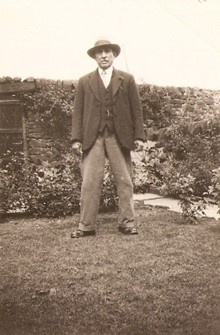
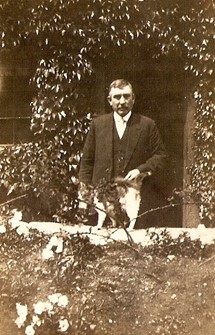
When I arrived home my father and sister were still at the mill, and I soon found that my grandmother couldn’t understand me. I had to revert to the dialect so she could tell what I said. My father and sister arrived home. My sister had grown into a young woman; fourteen to eighteen makes a big difference. My father had been to Barrow-in-Furness making munitions and my sister and grandmother had kept the home fires burning while we had been away.
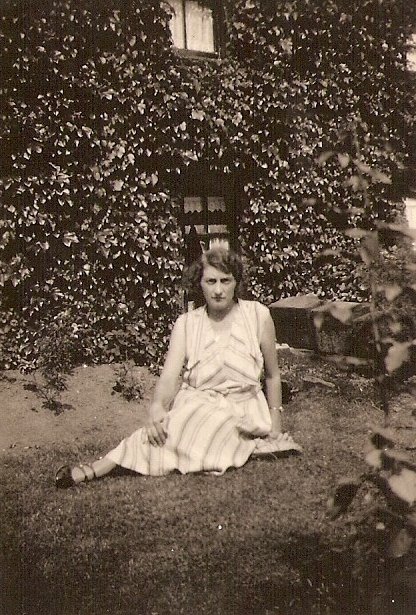
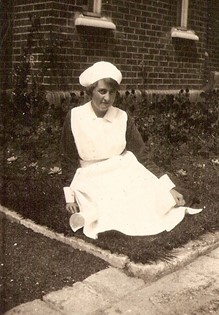
My grandmother welcomed me with open arms and had a little cry. I was rather surprised at this as she was not an emotional woman. She’d had a hard life. She’d had ten children of her own, only four were still alive. She told me that she had lost three of them in five weeks to some kind of fever. And then she had raised my sister and me from babies as well as taking in nursing. The women had to get back to work a few weeks after their babies were born, and they took their babies out to nurse by women who were too old to go to the mill. Six o’clock in the morning until six at night. She was paid five shilling a week for this, which went to help the family budget.
She told me about what they called ‘the cotton panic’. It was during the American Civil War when no American cotton came to Lancashire and the mills closed down. There was no welfare state in those days. She said some of the people went round the garbage cans collecting potato peelings to wash and eat.
When she was seventy years of age Lloyd George brought out old age pensions.43 She had no birth certificate but she knew she had been born in a small village near Lancaster. A friendly insurance agent wrote to the village church and found that she was the first entry in the register of births and deaths. So she got her five shillings a week old age pension. And I’ll say she had earned it. She used to say, ‘This is my money’, but I think most of it went into the family income.
In the evening she would say, ‘Fetch me a gill of stout’, so off I would go to the local pub, which wasn’t far away. ‘A gill of stout for my grandmother’, and the publican’s wife, who had known my grandmother for many, many, years used to fill up a big pint mug. I’m sure the stout made her sleep, as she wasn’t a drinking woman.
Her cronies used to come and visit her and tell many weird and wonderful tales of the old days. I listened too, sitting by the fire. My grandmother was a good tale-teller and was good company by anyone’s standards. I was amazed at how she had aged during the four years I had been away. She had had pneumonia during the war and it had left her very weak, but she still pottered about doing whatever she could.
About two years after I got back, she had a stroke. She was paralysed and couldn’t speak. She knew she was dying but she faced death with the same resolution she had faced life. I held her hand while she passed away. It was only then that I realised what a ‘Britannia’ she had been. If my sister and I have any ‘guts’ that’s where it came from.
The day after I arrived home, I went scouting for my mates. Chip had been home some time. Another of our mates had been married during the war and had treated his wife badly, very badly, so we dropped him. We met up with two other young men, who had been in the navy, Harry Brenand and Harry Smith. Smith’s family moved to Blackburn and soon Chip joined the Police Force. He had an uncle who was chief inspector in the Lancashire county constabulary so it was almost inevitable that he would join the force. This left Harry Brenand and me. We got along very well together. We had two mongrel dogs, sisters out of the same litter, and we walked them around the hill every night, hail, rain or shine, and mostly in the dark. It was good for both us and the dogs.
Sundays, we wandered around the Ribble Valley. Saturdays, we went to Blackburn five miles away. Five pence return on the train, sixpence on the football field to watch Blackburn Rovers play many famous teams, a twopenny jellied pork pie when we left the field. A beefsteak pudding at the Grosvenor for four pence and sixpence to go to the Palace Theatre to see a variety show; an afternoon and evening out for two shillings. This went on for two or three years.
Harry’s father came to ask me if I would go with them to Blackburn Infirmary. Harry had appendicitis, he had been sick for a few days. We went in a taxi and when we left him he was in great pain. He was dead the next day. When they operated, the appendix had burst; he had peritonitis. He was only twenty four, a fine strong young man. I was beginning to think that there was a hoodoo on me, the way I lost mates.
I couldn’t find another suitable mate. Most of the young men had learned to drink while in the army and their Saturday nights were merely pub-crawls, and this was no good to me. I was at a very loose end. I had been very unsettled in my mind since I got back from the war; every time I heard a train whistle I wanted to be off, but how, or where to, I had no idea. I seemed to belong to a different race. People seemed to worry about a few pence or some trivial things, and we who had seen the awful wastage of war, were disgusted. The moneygrubbers who had grubbed all through the war were still grubbing. I know now that it mostly was ‘me’. I had a chip on my shoulder; it would have taken a psychologist or a psychiatrist to have understood my moods then.
I had gone back into the mill a few weeks after I got back, but I didn’t fit into the groove any more. Great Harwood was a weaving town with no other industry, and all the better jobs were closed shop. Drawers in, tacklers (mechanics) and tapers were family affairs, and a weaver couldn’t get into their unions unless he married into the family.
I was sacked at this mill for smoking in the toilets. All the returned men used to go out for a smoke during the day. I think I was sacked as an example to the rest of them. The young man who sacked me was under-manager and had been so all through the war. Whenever I met him in the street after, he could never look me in the eye, but I didn’t blame him. He only fired the bullet, which was made by the manager, part owner of the mill. When I heard many years later that he had lost all his money in the Depression I couldn’t feel sorry.44
This man had been forced by the health authorities to put up new toilets. When they were finished he labelled them ‘Males’ and ‘Females’. I didn’t go for ‘Ladies’ and ‘Gentlemen’; ‘Men’ and ‘Women’ would have done for me. To me these labels summed up his attitude to his workforce, and every time I passed these labels, ‘Grrrrrrrr’.
I was sacked again at another mill by the owner’s halfwit son. He followed me into the toilets and when I lit a cigarette, he said, ‘You’re sacked, go and get your card’ and I did just that. The under-manager told me later that if I had gone to him he wouldn’t have let me go; he said, ‘No-one takes any notice of little Milton’.
It was now that I had no mates, that I discovered books. I joined the Co-operative Library, and I remember the first book I took out. It was In the Forbidden Land; a Journey Into Tibet, by A H Savage Landor. Then I read all the Scott and Shackleton Antarctic expeditions, Fridtjof Nansen’s Furthest North, Prescott’s The Conquest of Mexico and The Conquest of Peru, and Bullen’s The Cruise of the Cachalot, a whaling story that everyone should read. I read all the travel and adventure stories I could get, biographies and autobiographies, for lighter reading, Jack London: The Valley of the Moon, Smoke Below, The Sea Wolf, etc etc and Rafael Sabatini. I thought that Sabatini was a great psychologist and a very polished writer.
I used to sit in front of the fire reading, even on Saturday nights, with only my dog for company. She would be watching for a mouse to come out from under the fireplace, and then there would be five minutes diversion, a wild scramble after the wee creature, and the lighter chairs and mats would fly, until the mouse escaped under the door.
Journey to Australia
This brought me to the end of 1923, when I was twenty-five years old. It was now I got myself another mate. She was my sister Emily’s mate, Eda Frith. I asked her to walk out with me, which was as good as being engaged in those days, and the first weekend I walked her off her feet. I now had something to live for, and we started to make plans from the first day. I handed her all my spare cash as I was a spendthrift and she knew how to save. We soon had £100, which was a goodly sum in those days, and we started to look at new houses, nice modern houses, which were about £600; £100 would have been enough deposit.
Eda’s Aunt Ellen Phillips came over from Australia for a visit, and told Eda that her sister, Lily, who had been in Australia since 1919, would like her to go out to Australia. We discussed this, and decided to take the plunge. I had met a lot of Australians during the war and liked their easy and independent way and I thought they had a better standard of living than we had. So in 1925 I married my Eda: for better, for worse, for richer, for poorer, in sickness and in health, until death do us part. And that’s the way it’s been; but mostly for poorer.
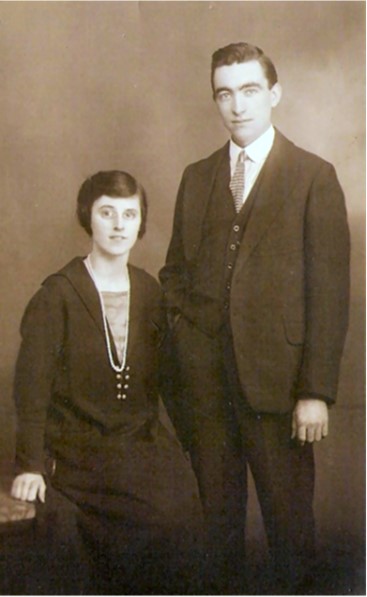
We have been up a lot of dry gullies together, and she has always lived up to the RAMC motto; In Arduis Fidelis, which translates as ‘Faithful in Difficulty’. We were ideally suited to each other and were quite happy making plans for our new life. So Eda’s sister nominated us for Australia.
We had a lot of planning and preparation to do. We bought packing cases and cabin trunks and packed our goods and chattels but it was two years before we finally got away. My father could never believe it, he said, ‘They will never go to Australia’, and when the final day came, he was very upset.
My sister accompanied us as far as Blackburn and we said goodbye. I didn’t realise at the time that she was losing both her mate and her brother, and that I was leaving her in the same position as I had been in before I met Eda.
And so to London. We had been directed to a hotel by the emigration authorities. It was in Gower Street, and it was quite a magnificent place, a huge foyer with deep carpets, but it wasn’t for us. We were taken across the road by a pageboy to the migrant hostel, where some of the people there were Germans going to East Africa. Our room had two single beds and nothing else. We had to live out of our portmanteaus.45
We had three days before the boat sailed so we decided to make the best of it. We were in the centre of London and next morning, after breakfast, we went out and bought a map of London. We found that we were within walking distance of a lot of interesting places. This suited us as we were trying to conserve our cash. We went to Green Park and remarked how much further forward the flowering plants were than they were in Lancashire. The children were feeding the tame squirrels with biscuits. There was quite a good zoo in Green Park. Park Lane, where all the millionaires live was along one side, and along another side was the famous Rotten Row where they went riding. Later we went to Buckingham Palace and saw the changing of the guard, along Whitehall to the Horse Guards and Trafalgar Square.
We went along Piccadilly and the Strand and saw the famous theatre, Drury Lane. We would have liked to see Madam Tussauds, the famous wax works, but it had been burned down sometime previously. We went to the British Museum and strolled through the Egyptian and South Sea Island departments, but one could spend a month in the British Museum and not see everything. On Sunday we went to see the Tower of London and the Crown Jewels, but unfortunately the Tower was closed on Sundays. We spent an interesting day just wandering around. Monday morning we caught the boat train to Tilbury, and met Eda’s aunt, who had come straight down from Lancashire. The Largs Bay was out in the stream and, after showing our passports and papers, we boarded the tenders and were taken out to the ship.
The Largs Bay was 13,000 tons and belonged to the Commonwealth Line, a one-class ship. We soon found our cabins, which were six berth. I was right up in the bows of the ship. Eda was amidships and Auntie somewhere else. Auntie knew the ropes so we got deckchairs and planted them on the promenade deck, amidships, and tipped the deck steward to keep them there. This position made for us a much more pleasant voyage. Most of the migrants didn’t seem to know that they had the run of the ship and spent most of their time down on the well decks.
We sailed late that afternoon, but we didn’t see the White Cliffs of Dover as it was dark as we went down the Channel. The next day we went through the Bay of Biscay, which belied its reputation and was quite calm. But as we approached Spain it started to blow and we saw a beautiful white power yacht butting into the wind, the spray flying right over the top of it.
Evidently the captain was trying to make the voyage as pleasant as possible; there was a bulletin on the board every morning telling of the places we would see and something about them. He went as close to the coast as he could with safety and, as we passed Cape Finisterre, we could see nuns waving from the windows of a convent. On through the Strait of Gibraltar and along the coast of North Africa, so close we could see motorcars moving along the roads.
We made friends with an Irish-American and his wife. He had been persona non grata with her people but had married her secretly just before they sailed. She was travelling as Miss Donovan and showed us her wedding ring, which she kept on a thin chain round her neck. He insisted on showing me his credentials and took me down to his cabin, a dark two berth without a porthole, which he shared with an old man. He had been a fireman in a New York fire brigade and had been pensioned off because of an injury to his leg, which was badly scarred. He was good company and told us some interesting stories of his firefighting days. One was about a short ladder they had, with two big hooks on the top; they would stand on a window sill and crash the two hooks through the window above, climb up to the next sill, and so on – a very dangerous game. Nowadays they have huge mechanical extension ladders, but it’s still a very dangerous job. He also told us about coming home from a holiday and crossing a busy street in New York when his portmanteau flew open and deposited his dirty washing into the middle of the street. Was his face red? Very embarrassing!
Down the Mediterranean to Port Said. At the entrance to the Suez Canal stands a statue of de Lesseps, the Frenchman who engineered the building of the canal. He also started building the Panama Canal but was beaten by the Culebra Cut and Yellow Fever. Some years later, the Americans completed the canal but they had to beat the Yellow Fever first, with insecticides.
The ship tied up to a wharf just inside the canal and we saw the usual boys diving for pennies thrown into the water. Boats came around selling souvenirs, the men in the boats shouting ‘You know me, my name is McGregor’, or ‘My name is McKenzie’. Very dark looking Scotsmen! We bought a solid brass candlestick carved with pyramids, palm trees and camels. Very Egyptian looking but probably made in Birmingham. In the afternoon we had a walk around the town, which brought back memories of my army days. In the evening we went out again. Eda was buying a bright red Spanish looking shawl with a long fringe when suddenly all the lights went out. We were a bit apprehensive; Port Said had a very bad reputation. All the lights in the street had gone out, but we got back to the ship safely.
The next day, we steamed through the canal in a long line of twelve or fourteen ships, a few hundred yards apart, travelling very slowly at a set speed. We have been through the canal twice since then, but it is always interesting as the banks are constantly being repaired and the channel dredged; camel trains, desert and oases.
The ship stopped at Port Suez and took on fresh water for the long voyage to Colombo in Ceylon, before going down the Red Sea and across the Indian Ocean. We dined at what was known as the Captain’s Table. He only came down once during the voyage, but we always had an officer of some kind at the head of the table. He was kept busy answering questions about the ship and the voyage. Across the table from us sat an old lady; she came from London and was evidently well educated and probably had private means. She told us that she had two daughters married to sheep farmers in Western Australia. She insisted that she was only going to visit her daughters and intended to die in her ‘dear old London’. She had to wave a long blue scarf from the ship when we arrived at Fremantle, and her daughters would do the same from the wharf. We saw very little of her in the hot parts. I think the heat got her down but she told us that the stewards had been very good to her, bringing her tea and toast, of which she was very fond. I think she spent a lot of time playing Bridge.
Neither Eda nor I played cards, not that we had anything against cards; we considered it a waste of time. We wasted our time sitting on deck watching for flying fish, sometimes a whale. Very seldom we saw a passing ship. But we did see a windjammer, a full rigged ship. There was only the least breeze and they had every stitch of canvas out – beautiful!
When we landed in Colombo, we invited the old lady to come with us. Eda and I with Auntie, the Irish-American and his wife, the old lady and a couple more friends made a two-taxi party. We passed the famous Galle Face Hotel and went along the beach road where we saw a twelve-foot surf breaking on to a steeply rising beach; magnificent. Through part of the native town, which was very squalid, and on to Mount Lavinia Hotel where we sat on the patio overlooking the sea, with iced drinks. Here, we saw a man climb a coconut palm, a rope around his waist and round the tree, alternately moving the rope and then his feet. He was quickly to the top and threw down the coconuts. Back in town we had afternoon tea in a café. We got talking to the waiter; he had a wife and two children and was very poorly paid so we gave him a good tip. Later we had a meal at the YMCA. The place was full with Largs Bay passengers; it must have been highly recommended. The next day we departed for Fremantle.
Half way across the Indian Ocean lie the Cocos Islands, where the Australian cruiser Sydney sank the German cruiser Emden in the First World War. They are sandy islands, a few feet above high water, almost covered with coconut palms. I think the captain knew someone on the island. Each voyage the passengers were asked to contribute books and magazines and these, with a few luxuries unobtainable on the island, were put in a barrel, which was sealed and put overboard with a flag and a light on top. It was going dark when the barrel was put overboard but we had time to see a large whaleboat with several pairs of oars put out from the shore to pick up the barrel
When we landed at Fremantle, the old lady waved her blue scarf and was answered likewise from the wharf, and we saw her depart safely. Fremantle wasn’t much of a place in those days: just wharves, railway lines and sand, but the Scotch thistles liked it. They were six feet high and full of seed blowing all over the place. Auntie insisted that we try the crayfish. We found a café and ordered crayfish. One slice, an inch thick, was quite a meal and was very tasty; it almost filled a dinner plate.
The next day we went to Perth by bus. The bus stopped on top of a hill and we looked down to the Swan River and Perth. It was early June, wintertime in Australia and a bright sunshiny day. When we got to Perth, Erey, the American, got talking to a car salesman. As it was near the salesman’s lunchtime, he offered us a ride in his car. He drove us around all the nice places, and we sat in his car while he went in his house and had lunch. It was a nice house and garden in a street of houses well-spaced and set among lovely trees. We were impressed.
Back to the ship and through the Great Australian Bight. The Bight was rough and lifelines were rigged along the deck. Anyone who ventured on deck risked a ducking as the spray was flying right over the promenade deck.
And so to Adelaide. Adelaide was quiet, with dignified public buildings, trees and botanical gardens. Quiet, but of course it was Sunday. We sat in a park watching some schoolboys play cricket and I was introduced to the Truth newspaper. When we left there I left the Truth on the seat, as I considered it a muckraker.
On to Melbourne. We had presents from home to deliver in Melbourne. Our first call was to some people Eda knew. The daughter was engaged to the secretary of the weavers union. He offered to find us jobs in the mill, but we hadn’t come 12,000 miles to go back in the mill. An interesting speculation: what would have happened if we had taken the job? It might have altered our lives altogether. Our next call was on a middle-aged couple. They took us downtown and we met their daughter who was a sales girl in the Myers Emporium. We didn’t know these people, but we had been asked to take them presents from their relatives in Great Harwood. They took us home to tea and, after tea, the man took me into the backyard to show me how he made his living. There were piles of cured rabbit skins and these were put into a machine, which clipped the fur down to about a quarter of an inch long, and then they were put into a vat full of the blackest dye you can imagine. After a while the skins were taken out and dried. When they were dry they were put into an eight-foot hollow wheel. Skins and sawdust and the wheel turned slowly for I don’t know how long. He showed me the finished product, which was beautiful, black shiny coney seal.
While we were in the yard Eda was talking to the lady of the house. She turned out to be a Spiritualist and was telling Eda her fortune. She said, ‘You will have two children, a boy and a girl, and they will bring you much happiness’. She wasn’t far out. We have a daughter and two sons, and they have brought us much happiness. We had to leave early as we had booked at the Capitol Cinema. It cost us eight and sixpence a seat, but it turned out to be the most magnificent theatre we had ever been in. We walked on carpets an inch deep to our seats in the Circle. The seats were the ample armchair kind and if you leaned back the whole seat went with you. I can’t describe the ceiling except that there must have been thousands of light bulbs hidden in the contortions of the plaster, but you couldn’t see one of them. After a while, someone must have played the switchboard like playing an organ and we had dawns and sunsets and a whole series of moving psychedelic patterns in all the colours of the spectrum. Then the whole orchestra rose from out of the floor on a platform and the organist in bow-tie and tails stood and glared at the audience to make them stop talking before he started to play; he made that Wurlitzer organ talk.
After the cinema, we started off to walk back to the docks and the ship. We were used to walking, and it never entered our heads to take a taxi. About half way to the ship (we were walking quickly as it was a frosty night) we came up behind three men, big men; they had rugby jerseys under their coats, and bottles in their hip pockets. They were weaving about half drunk and they looked the right type to bowl us over. We would have been well worth bowling over. Eda had £100 in a body belt and I had a gold watch and a few pounds in loose cash. So we slowed down and let them get well in front and we were very relieved when they made off down a side street and we got back to the ship safely.
And so, on to Sydney. After passing through customs, which was easy, and seeing our luggage on the way, we got a tram to the station. We saw very little of Sydney.
New beginnings
We arrived in Sydney on Thursday, 9 June 1927 and travelled straight to Newcastle arriving about 7pm. Eda’s sister, Lily, and her husband had arranged a ‘Welcome to Australia’ party, and a host of second cousins were there to greet us.
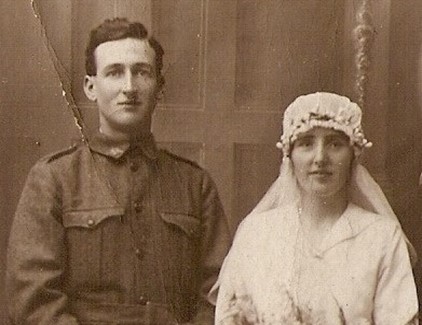
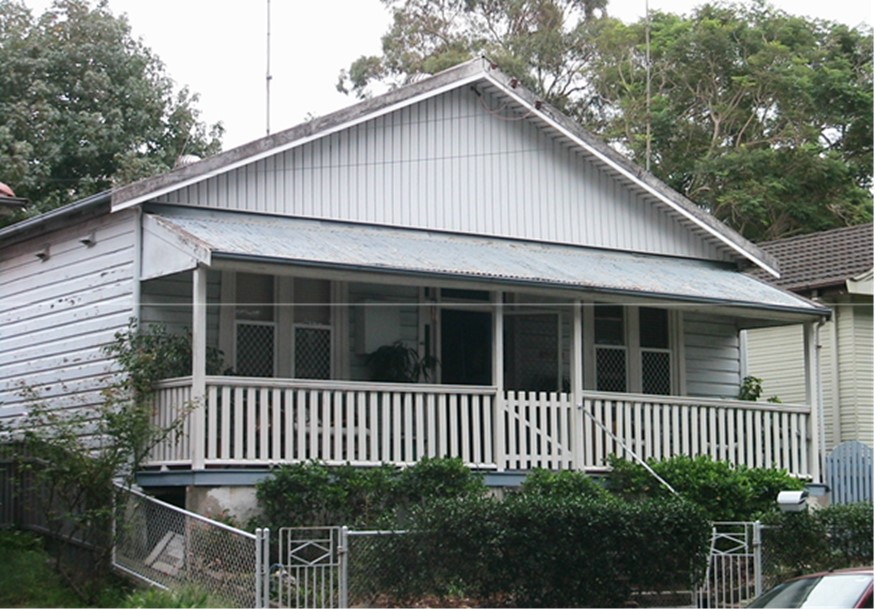
Eda’s sister Lily and her husband. Bill and Eda first lived with them when they arrived in Australia at Kings Road, Tighes Hill. This photo of the house was taken in 2009.
Lily had asked us if she could put a deposit on a block of land next to them in Tighes Hill and we had agreed, but when we got up next morning and saw the block we were very disappointed as it was smaller than the one we had left at home.
I had been promised a job by Jack Crocket in his Fibrous Plaster Works, but he said he was sorry and that he was already laying men off. It was the beginning of the Great Depression though we didn’t know it then.
So down to the steel works every shift: 8am, 4pm and twelve midnight. It was a few days later when I was informed that I had to be registered before I stood a chance of a job. The employment officer had an unenviable reputation, but I plucked up courage, and bearded the lion in his den. My size was against me before I opened my mouth. ‘What have you been doing?’, ‘Cotton weaver’, ‘Let me see your hands’. When he saw my soft hands he shook his head, but I think he registered me in spite of this.
I decided to try Walsh Island Dockyard among other places, and this was the only place where I received the slightest hope. Says the boss, ‘If you can bring me a boilermaker, I will give you a job’. But it was a forlorn hope for me; I didn’t know any boilermakers. Then Will Easton, my brother-in-law, Lily’s husband, said he knew somebody, who knew somebody who worked at Walsh Island and who would speak for me. I was informed not to go to the Island, but to wait until I was sent for. In the meantime I had painted Will’s house and terraced his backyard and was growing vegetables.
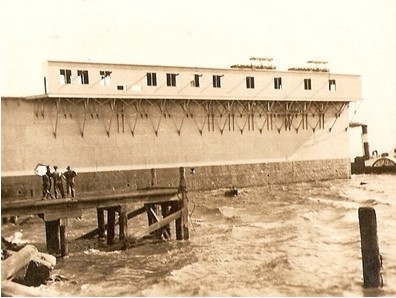
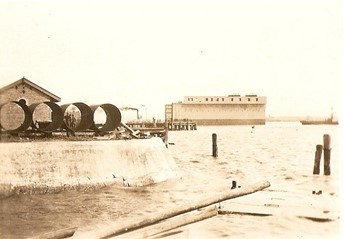
It was a few months since we landed and our money was getting down. Things were looking very black and I was rather surprised when I received word to go to Walsh Island, only a week later. I started work with a boilermaker who had come down from Queensland – Old Sam. Our first job was sweating rims on dredge pipes. The rims were put into a furnace and made red-hot. Even when the rims were red hot and expanded there was little clearance and they had to be hammered on using a hammer called a mundie. It was about fifteen pounds weight I guess and I could just swing it. After the first day my hands were blistered, the second day the blisters were torn off. The third day I went to work with my palms covered with broad plaster. About a week of this, and then we got another job: knocking rivets out of an old dredger and taking off the plates using a seven-pound hammer. It felt like a toy after the mundie. From then on everything went well.
Soon after I started work I was reading the newspaper and saw an advert for farmlets for sale at Sandgate, from two to nineteen acres. I remarked to Will that I would like a two-acre block, and he seemed interested. So at the weekend we decided to have a look at them. The two-acre blocks were ten chains long by two chains wide, 660 feet by 132 feet, so we decided to attend the sale, and also not to go to more than £100 per block.
There were about thirty people present, mostly spectators. We bid up to £100 and then stopped, someone bid £110 but we stood firm and then we were informed that we could have a block for £100. Evidently it was a company man that was bidding against us. £10 deposit and £1 per month. Only one more block was sold to a Mr Dalton who bought a gully next to his own block in King Street. I think it was a good buy for £60 as it was a natural garden full of Lilly Pilly and wild cherry trees.46 Years later our children used to play in this place. They called it the ‘kindergarten hideout’. I think there were plenty of snakes down there too, but it was a risk that had to be taken. Mostly, snakes get out of the way if disturbed; I think one would have to tread on a snake to get bitten. I must have killed about fifteen snakes over the years, mostly red-bellied black snakes up to about three feet long. These snakes grow to five or six feet. I wouldn’t like to be bitten by a big one.
The next job was clearing. Everyone said you must clear the trees off, so we bought axes and a crosscut saw and felled a lot of magnificent gum trees. I was sorry about this later, but I suppose they would have had to come down sooner or later. We cleared the front first, and Will mortgaged his house at Tighes Hill and had a house built on his block. Meanwhile Eda and I lived in with them, and then we started to build our own house.
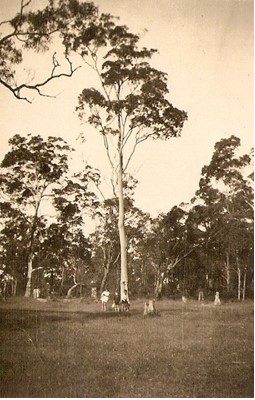
We ordered timber as we needed it. Piers and bedplates and bearers first and studs and top plates later. I had six miles to cycle to work, and weekends were spent building the house or, if I ran out of timber, digging the garden. Weekends and holidays were welcomed so that I could get on with the job. If I was rained off at Walsh Island I would come home and spend the day digging the garden in the rain with a corn bag round my shoulders.
I remember an incident at Walsh Island, while we were building a floating dock. I was working with a boilermaker named Costello. We had to put up an angle iron inside the walls of the dock. I got two ropes and we hauled up the heavy angle iron but when it came to holding the rope with one hand, to put in the bolt with the other, it was beyond me. Costello was a big young fellow and he got his bolt in. ‘Hang on Bill’, he got across and put the bolt in for me. We were about forty feet up inside the dock wall standing on a four-inch bar. By the time he put the bolt in I was sweating and quaking at the knees, I had to sit down. We should have had a block and tackle.
I had just two years work at Walsh Island when the place closed down. By this time I was working with a young boilermaker named Wally Hume. We were the last pair working on the floating dock, all the others having been laid off. We had been kept on to finish little odd jobs which had been overlooked. Wally said he would go to Melbourne and I haven’t seen him since. Half of the workforce was unemployed, and things looked very black. I had just finished the framework of my house and had enough flooring for the whole house, but only enough weatherboards to cover half the house. I had ordered the rest of the weatherboards, but I cancelled that order immediately. We had £17 in hand so I bought enough iron to cover two rooms, and a Primus stove.
I covered the back two rooms with the iron; weatherboards round the back. I laid the flooring in the two rooms, and the rest of the flooring on the middle wall. I heard a man walking along the road say, ‘That’s a damn funny house’, and so it was, but we weren’t the only ones living in a funny house. People were living in fowl houses and old tramcars. I remember one man who had almost paid his house off when he became out of work, they let him live there for six months and then foreclosed, and he came out to Shortland and built a two roomed shack. Two young men lived in a little tin shed with just enough room for two camp beds. They had to do all their cooking outside. They called the tin shed ‘Hotasell’
This place was later taken over by Barney, an ex-Royal Navy man. He felled a huge tree and then started to dig out the stump, digging and chopping for a fortnight, but he had a big white draught horse and, when he had chopped the stump loose, he harnessed the horse to the stump and tried to pull it out. Not a hope, an elephant couldn’t have pulled it out. He finished up burning the darn thing out. We had many a good laugh about this
When I had finished the shack, we moved in. Next morning lying in the bed, I said to Eda, ‘I’m glad your mother can’t see you now. You’re camping in the Australian bush, married to a pauper’. We now had to go ‘on the dole’.47 We got a ticket for seven shillings and eleven pence. One was not allowed fig or strawberry jam, one had to be content with lemon and melon, and all the cheapest groceries. By now I had a good garden going. I had passion vines growing on all the fences. We had peas and beans, cabbages and cauliflowers, potatoes and onions, and sweet potatoes, and this was our salvation. I was still clearing up the paddock and sometimes at night we would go up the paddock, sit on a log, and feed the fire that was burning out a stump. And we used to sing; our motto must have been, ‘never let it get you down’, we sang everything from comic songs to hymns. Sometimes passing neighbours stopped in the street and listened to the ‘concert’.
Mornings were spent looking for work, but it was a hopeless task. I wore the tyres off my bike looking for work. Occasionally I got a day’s work. We used to go to the Trades Hall and, if all the wharfies were employed, a few men were picked. One day I was lucky. We went down to the wharf where a ship was loading cement. Down into the hold, a man with a collar and tie peered over the hatch, and said, ‘I want these bags stacked nicely’. Jute bags with 100 pounds of cement in each. Later, the foreman stevedore said, ‘Build a wall across the centre of the hold and we’ll tip the rest behind it’. We were getting an hour extra for loading cement. It was dusty and a health hazard. When we had finished that, we had to load boxes into another hold. The boxes were heavy and had to be stacked. At four o’clock we were told to get something to eat and come back and finish the job. I went to a dockside café and got a three-course meal for a shilling. The food looked very unsavoury but I was hungry, so I ate the lot. I sent a telegram to Eda as I knew she would be wondering where I had got to. 4 pm to 6 pm rated time and a quarter, 6pm to 10pm, time and a half, 10pm to midnight, double time. I got £6 for the double shift, quite a windfall. Another job on the wharf lasted only two and a half hours. I got six shillings and the foreman stood over us the whole time urging us on. I was out one day when a man came to the gate of the lamp works, ‘Want a day’s work?’ I wheeled right in. ‘Clean up the yard, stack all this rubbish at the end of the yard.’ I had no food, no money and no smokes. It was a long weary shift for which I received thirteen shillings.
I got two shifts at Rylands, stacking spelter and galvanizing material, 50 pounds in each block. We had a standover foreman here also; thirteen and threepence a shift. These jobs were few and far between. I used to go to one place to stand at the gate with perhaps thirty or forty other men, from half past seven. At nine o’clock the employment officer would come out and hang up a card, ‘No hands wanted’. They christened this man ‘Smiler’; he had never been known to give anyone a kind word or a smile.
By this time, a lot of tradesmen were out of work and some tradesmen were working as labourers. Men who were in constant employment had to keep their heads down as there were a lot of men standing at every gate, and it was well known that some men were receiving half wages while signing for full wages. Rafferty’s rules everywhere.48 I was a handyman, ‘Have tools will travel’. I got a job from a farmer down the road called Snifter McLean. A gale had blown the iron from the roof of his barn. The iron was old and twisted. ‘Do the best you can with it’, says the farmer. It was a high barn built of bush timber. The battens on the rafters to take the iron were saplings and ran out to one inch in thickness. I had taken a young man, Walters, with me to fetch and carry, and when I went on top he stood below saying, ‘I wouldn’t go up there for a fortune’. I had several more small jobs from this farmer and later was able to buy from him a yearling heifer calf, which we called Judy. Of course we had to wait another twelve months before she had a calf and got some milk. We had plenty of food, but were vegetarians and we got meat hungry.
I had strawberries growing in the garden and Eda made some strawberry jam. I went down to Tighes Hill to sell it. I sold a few jars, but I was a poor salesman, and I had two, two pound jars left. So I went into Mr Cherry the butchers, ‘How about some meat for this strawberry jam?’ ‘Yes’. I got a sugar bag full of meat for four pounds of jam. Half a pigs head among other kinds of meat. Eda made brawn from the pig’s head, and we had a meat orgy for a week.
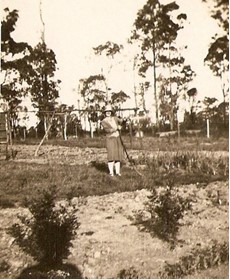
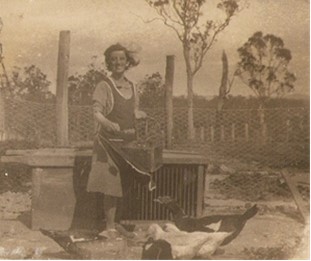
Clothes were almost impossible. I wore shirt and trousers and boots. No singlet, no underpants, no socks. We couldn’t afford fruit and toothpaste was out of the question. We cleaned our teeth with salt and my teeth began to suffer. Eda got Pyorrhoea in her gums and blood followed the toothbrush. She had to have all her teeth drawn, and it was a long time before we could afford dentures.
Things were as bad as could be, when Eda informed me that she was going to have a baby. This was a bit of a ‘facer’ as we used to say in Lancashire. We had been married six years and had always wanted a family, but what a time to start. The little stranger would be welcome, and we were a bit apprehensive for the future.
Eda kept in good health and had about two months to go. She had to go and see the doctor for a progress report. I had been out looking for work and was coming home when I ran into her near the station. She had on an old brown coat and she looked a bit down. As I approached her, I was mad with frustration, I couldn’t speak. I just nodded to her and rode on. This was one of my worst moments, I was down, but, damn it, I wasn’t out. I would just have to try harder.
On the evening of 8 March, 1932, about a month before the baby was due, we went to bed with a mosquito fire of smouldering cow manure on a piece of tin under the bed. The mosquitoes were very bad and we had no glass in the windows, only hessian bags. Eda woke me in the early hours of the morning to say that the waters had broken, but that labour had not really started. Eda was determined to have her baby at Lizzie Wilson’s house in Tighes Hill. At Tighes Hill the midwife could attend and a doctor could come if needed. Eda had everything ready so, early next morning, we walked a mile down to Sandgate station, caught the train to Hamilton and walked another mile through Maryville to Margaret Street, Tighes Hill where Lizzie and Fred Wilson lived. They breed women tough in Lancashire!
Lizzie immediately sent for the midwife, Nurse Lenaghan, and I sat down to wait. Labour was very prolonged. It was going to be a dry birth. After struggling with Eda all night, the midwife finally came out and said, ‘Send for the doctor!’ When Doctor Brown came, he gave Lizzie his bag of instruments to boil up in a huge jam pan on her stove. When I saw those instruments, which looked like instruments of torture, I could only pray that God would take the baby and leave Eda with me. The Doctor delivered Anne successfully, with just a few marks on her face and head where he had gripped her with the instruments. One of the nerves in her right cheek was injured, giving her a lopsided smile for a few years. It was Thursday 10 March, 1932; Eda was 34. On the nineteenth of March, Eda was sitting up in bed and we listened to the opening of the Sydney Harbour Bridge on Lizzie’s wireless.49 Next day, back to Shortland.
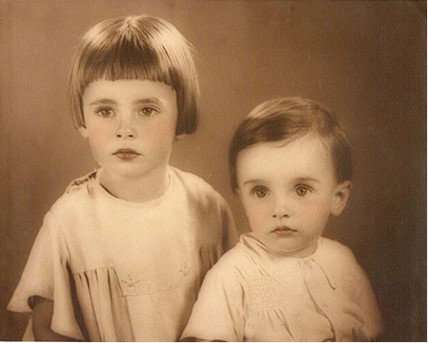
About this time I had been working in the paddock all day and I came down as it was going dark. Eda said she wanted some wood for the fire. We had a little wood stove by this time so I started to split some wood. I got a piece that wouldn’t stand up on the block so I held the piece with one hand and grabbed the axe half way up the handle. The axe handle caught in my belt and down came the axe on the back of my hand. A four-inch cut right to the bone. I went over to Easton’s and held it under the tap. I put on a tourniquet and draped a handkerchief over the cut. Will Easton drove me to Wallsend Hospital. The young doctor was brought from a party, and they took me to the operating theatre. When I took off the handkerchief the wound had opened up about an inch wide. The doctor took his thumb and swiped off the blood clot, and the cut artery squirted up a yard into the air. He had on a good suit and he jumped back quickly.He put in about five stitches, and gave me a drink of brandy. One of the bones was broken and was never set properly. It troubled me for a long time.
I was still on the dole, but had plenty of company. Every unemployed man had a number, and a scheme was brought in to give each man a fortnight’s work in rotation. My number came up only three times during those years, but I suppose every little bit helped.
By now our cow was milking, and we had a few fowls. We had bought two black Orpingtons and when they went broody we bought fertile eggs and set them under the fowls. We soon had quite a few fowls.50 With milk, eggs and vegetables from the garden we were better fed than most unemployed folk in the depression; but we had no meat for years.
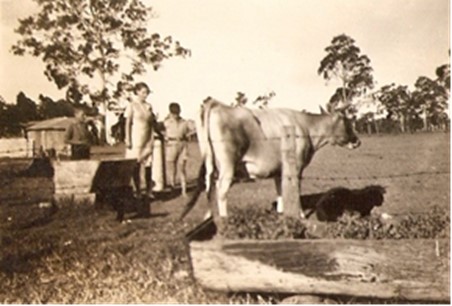
Eda had a lot of work: scrubbing bare floors; making butter and keeping all the milking gear clean; doing the washing outside, boiling clothes in a kerosene tin and looking after the baby. I was supposed to be unemployed, but I was working from daylight to dark every day, gardening and clearing. We had a few very dry years about this time and the paddock was very poor. What profit we made from selling a few eggs went to buy lucerne and pollard for the cow.51 I grew good oats in the winter, but corn in the summer was a failure. Maize is a gross feeder and I needed all the cow and fowl manure for the vegetable garden.
It was about this time that the government decided to give us work instead of the dole. Shortland is now a suburb of Newcastle, but in those days it was in Tarro Shire. It was a real country place with no proper footpaths or gutters and the roads were in a dreadful state. I, as a married man with one child, got one week per month work. A married man with three children got two weeks per month and with more children three weeks per month.
So we set to work to clean up Shortland. We graded the footpaths, dug the gutters and mended the roads. There was a shale quarry at the back of the hill, and this was used on some of the back roads. Mawson Street and part of Mort Street had never been made at all and were just a series of bog holes in the wintertime. This shale was mixed with a kind of red earth and bedded down wonderfully well, a great improvement. The transport was by horse and dray so it was a slow job. A bus service had started along the main road. The bus had broken four axles in as many months and the man who owned it was almost bankrupt, so you can guess the state of that road. We gravelled the main road and later it was made bitumen.
David was born in 1934, when I was working on cleaning up the roads. We were working in Marsden Street up on the hill. Eda had again decided to have the baby at Lizzie’s and had taken Anne down to Tighes Hill with her. About lunchtime, one of the Easton boys came running up the hill to tell me that the baby was born and that it was a boy. I was overjoyed. I threw down my shovel, picked up my lunch bag and said to the ganger, ‘I’m off! I have a son!’ and went straight home. It was Friday the 5th of January and I now had a son to carry on the name of Mercer. We named him David, after my father and my great grandfather.
When we first arrived in Shortland we were invited to join the Progress Association. This Progress Association was known as the Sandgate Wallsend Road Progress Association, and we were informed that the place where we lived didn’t have a name. We had a man who knew quite a lot about local government so we submitted three names to the Lands Department, and they selected Shortland. The Sandgate people were incensed about this, as they considered the place part of Sandgate. Meetings were called. To me these meetings were absolutely hilarious. It was a wonder they didn’t finish up as a donnybrook.52 Oaths and threats flew in all directions, but when the new school was labelled Shortland Public School and we got Shortland Post Office they had to give up and Shortland was established. Today Shortland is a prosperous suburb of Newcastle, with a university and a teachers’ college, a golf course and the BHP Laboratories.53
But I am getting ahead of myself. When we had cleaned up Shortland we went to work in a quarry at Thornton. We had to be up very early to milk the cow and do a few odd jobs before catching the lorry to Thornton. We picked up the Hexham men on the way. These Hexham men lived in boat sheds on the banks of the Hunter River, and fished for prawns in their spare time. They all had Jacob lines in the river. A Jacob line with more than six hooks is illegal, but these fellows had as many as sixty hooks on each line. One man caught an eighty-pound Jewfish one night. At sixpence a pound, a very nice pickup. Another man told us about feeling very cold in his shed. He went out one night, and took all the iron off a big hoarding and lined his shed with it. He worked all night, and by next morning had it all painted and unrecognisable. An unused church on Ash Island disappeared piece by piece until nothing was left at all.
When we were working in the gravel quarry at Morpeth, a man I will call ‘Clumsy’ was always the last into the lorry, clambering over the iron-shod tailboard, barking his shins on the way. He seemed insensible to pain. He only shaved once a week and never combed his hair. They told a story about him: he had a huge gash on his behind and his father stitched it up with string. I can well believe it. There were a lot of anarchists, but nobody blamed them; it was a case of every man for himself. The rock in the quarry was blown down by explosives and we proceeded to make the big rocks into little rocks and load it into lorries. We repaired all the roads around Thornton and Morpeth.
In 1936, when Eda was expecting a third child, she said, ‘The third should be easier. We certainly won’t need a doctor. The one we had for David didn’t do much. We can save the money and buy some flooring boards with it’. This baby was better prepared for, because I was getting some work. Eda had made some pretty embroidered baby pillowcases. She had made some little dresses, boys wore dresses at first, and smocked and embroidered them with rosebuds. John was born just before midnight on Friday 28th February and 1936 was a leap year. In later years, we told him he was lucky to have missed out on the disaster of only having a birthday every fourth year.
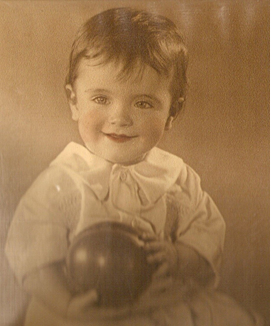
First thing in the morning, I woke Anne up and said, ‘Come and see what mummy’s got.’ I left them together and went to make breakfast. Eda told me that she asked Anne what we should name the baby, Bill or John? She said Anne looked toward the kitchen to see if I was listening and whispered, ‘John.’ So John it was; he was named after Eda’s father, John Frith. Both boys were given Eda’s maiden name as well: David Frith Mercer and John Frith Mercer. We had not planned to have a third child, but Eda always said that John was the best accident she ever had. He had a sunny disposition and, even as a child, spoke his mind. In attitude, he was like Eda; Anne and David were more like me.
So, in March 1936, we had three children and I was getting more work at the quarry, and in my time off was working with another man, Andy Miller, doing repairs and renovations and additions. One job we got was to pull down a house at Holmesville and re-erect it out at Lake Macquarie. It was a four-roomed cottage in perfect condition and the man got it for £40, as Holmesville was a dying town, the pit having closed down. We rebuilt it and added two rooms and a veranda. The man got a cheap six-roomed cottage.
Over the years I had been gradually making more money, and Eda kept saving a few pounds. I always said she was the best housekeeper in New South Wales. I had taken down the framework from the front of the house and rebuilt to an entirely new plan. In all this time we had only been to the cinema once. When a circus came to Shortland we managed to scrape up enough money to take the kids; it might be their last chance to see a circus while they were still young. It was a small circus, but it had excellent acts. The tightrope walker was world class. The children were fascinated with the animals, especially a baby elephant. I can still remember John’s delighted laughter at the antics of the clown.
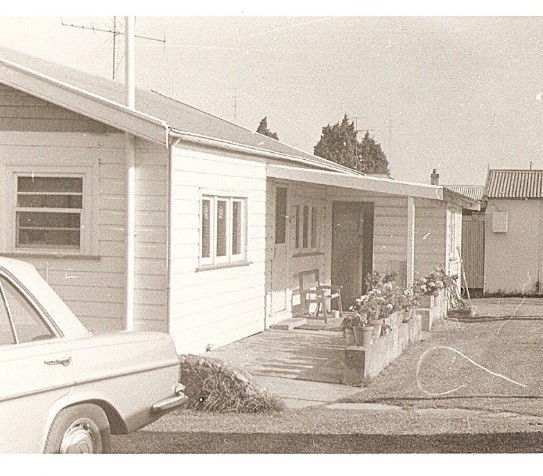
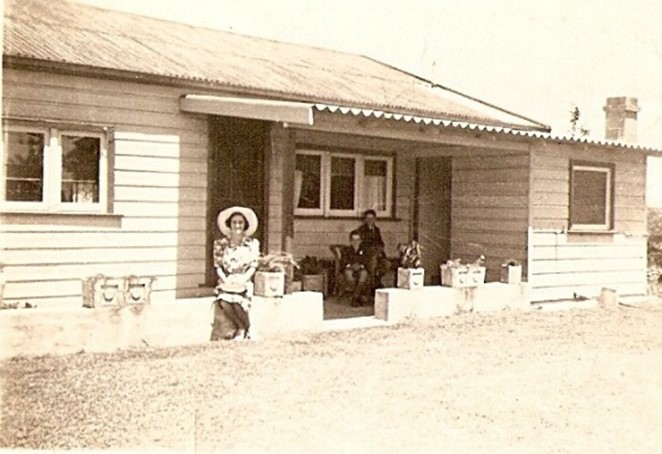
By this time we were getting so much work that I decided to give up the quarry and work full time on the building job. We were doing all right when my mate suddenly decided to go to New Zealand. He got a foreman’s job over there. So I got myself a new mate, Jack Nicholson. We got a job to build a house for the local butcher, Bob Jones. When he saw the finished job, he said, ‘I have eleven more for you to build’, and we thought we were all set. Later he came along and said, ‘It’s all off, my farm at Minmi has been burned out. I will have to hand feed until next summer’.
It was September 1939 and the Second World War broke out. We got a job at the showground, making the place fit for the troops. 6am till twelve midnight; it was good money, but eighteen hours a day was a killer. A good job but it only lasted a week. I went round the military camps for a while. Largs, Greta and even Tamworth, but they were all intermittent jobs, so I decided to go to the steel works and I got myself a job as concrete form carpenter. When the Government made an order, ‘No more construction work’, I decided to go to Stewarts and Lloyds. It was shift work but it looked like being permanent. It was while I was at the steel works that I received a call up for the army. We had to fill in two papers, name, address, married or single, have you had any serious illnesses, religion? They wanted to know everything about us. Eyesight test, height, weight, and a thorough medical examination. I passed A1. At the last table they asked, ‘Where do you work?’ ‘Steel works’. ‘Exempt!’ Why didn’t they ask us that first?
When the war broke out I had joined the NES (National Emergency Services) and one night we were awakened by what sounded to me like gunfire. I got out of bed to see if I could see anything but I couldn’t see anything that looked like war, so I got back into bed, saying to Eda, ‘They must be having a night practice at the fort’. When I went to work at the Steel works next morning I learned that Newcastle had been shelled from the sea by a Japanese submarine. They did very little damage as the shells were non-explosive armour piercing shells, but there were several near misses. One shell passed between the power house and a gasometer at the steel works and went harmlessly into the ground. One shell went through the roof of Lysaghts offices and later I saw where a shell had shattered the concrete footpath in Parnell Place. Two Japanese midget submarines got into Sydney Harbour and sunk a naval barge before being sunk themselves. Later we read in the newspapers that Darwin had been bombed and that the Japanese had wrecked the post office and killed the Postmaster and his daughter. It wasn’t until after the war was over that we learned that the Japanese had sunk every ship in the harbour and badly damaged the town. Much later, it came out that Darwin was bombed repeatedly, but that news was censored. That was about the extent of the war in Australia.
When the Japanese bombed Pearl Harbour and America came into the war, then began the slow process of driving the Japanese back to Japan. When the Americans dropped the atom bomb on Hiroshima and Nagasaki, the Japanese cried, ‘Enough!’, and that was the end of it.
I started work at Stewart and Lloyds in 1942 on what was known as the dogwatch: midnight to 8am. I got a job testing steel tubes with water pressure. It was a wet miserable job so when the boss came in the next morning, cheeky me says, ‘I want a better job than this’. So he gave me a better job and by the end of two years I could work every machine in the shop.
I had been away on two weeks annual holidays and, when I got back, I was told that they had started a bonus system while I was away, and were having trouble keeping tally clerks on the job. I thought I could do the job, so I bowled up to the office and asked for the job and got it. There were twenty machines in the shop and each man had a separate sheet. I had to keep a record of the order number, size, gauge, quality of the material, what the operator was doing to it and the time taken to do it, also a record of all stoppages and why the machine was stopped. There was a set time and number for each process, and the men had to exceed this to earn a bonus.
The bonuses generally worked out between thirty and forty per cent on their wages. I could do this part of the job all right, but I soon found out that I was between the boss and the men and that the job called for considerable diplomacy. The boss had his eye on me and so had the men. This worried me, and, when I am worried, I sit down and think about it. So I kept my own counsel and worked out a policy that suited both the boss and the men, and I rode this razor’s edge for sixteen years.
The boss often came to me to ask me to keep an extra check on some special job, so one day I told him I didn’t think I was getting enough pay for the job. We had quite an argument about it. My bonus was limited to twenty five percent, but I got an extra two and a half per cent out of him. This boss came from within a couple of miles of my own hometown and I got friendly with him in a guarded sort of way. One winter’s day I was having a warm at the furnace when he came over for a warm too. I sneaked a look at my watch. Says he, ‘What time is it by your gold Waltham’, so I pulled my watch out. ‘By God, it is a bloody gold Waltham’, and when I bought a motor car he asked me what deposit I had paid on it; I told him I was paying cash so he called me a ‘bloody plutocrat’.
One day he asked me if I was any relation to John Mercer who invented Mercerised Cotton. I said that he was somewhere in my ancestry. He then said that he could trace his ancestry back for hundreds of years. I thought about this and sometime later I told him you can only trace the name. Everybody has two parents, four grandparents, eight great grandparents and so on; assuming that there are four generations in 100 years, in 700 years everybody has 268,000,000 ancestors. There were only a few million people in Great Britain at that time; this allows for a great deal of inbreeding, so that makes all men brothers or at least second cousins. He looked at me and then dashed off to his office. He came back sometime later with a sheet full of figures. He said he reckoned that there were five generations in a hundred years, and he reckoned it up to an astronomical figure. Very funny!
Everybody participated in the bonus, crane drivers, crane chasers, fitters, leading hands and cleaners. They received what was known as the General Participants Bonus. Everybody was flat out trying to make the bonus, so that very little supervision was necessary, and the bosses used to sit in the office yarning about anything except work.
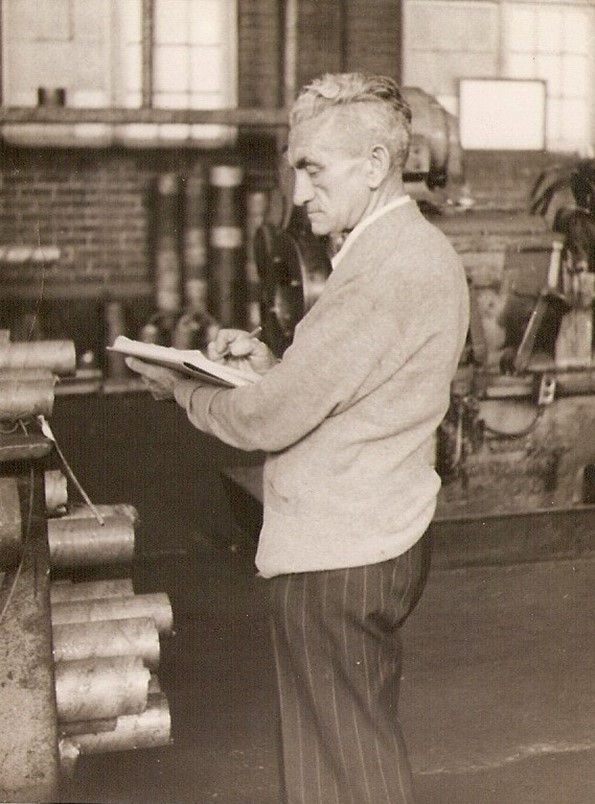
A trip to England
In 1956, when I was 58 years old, I began to develop Arteriosclerosis.54 The doctor told me never to get over-tired either mentally or physically, but I had to earn a living, so I started to take Veganin tablets to ease the ache and cramp.55 After a while, the tablets ceased to be effective, so I went to the doctor again when I was 63. He tested my blood pressure, looked at me and said, ‘Your blood pressure is high enough to put you on the invalid pension. Take a fortnight off work and come and see me again’. Eda and I talked it over and decided that I would finish my twenty years at Stewart and Lloyds and then retire. But it was not to be. When the fortnight was over I presented the doctor’s certificate at the ambulance room at the works and the ambulance officer refused to let me start, because there was something about ‘cardiac’ on the certificate.
So back home and another conference with Eda. She said she was old enough for the old age pension, 60, and if I got on the invalid pension we would be able to manage. We went to see the doctor again and I told him that I’d decided to retire. He said, ‘You’re wise. You will live longer’. He gave me another certificate for the government doctor and I had no trouble at all getting on the invalid pension. Later, I went to the works and told the employment officer that I was retiring through ill health. They couldn’t do enough for me. He said, ‘We like to look after our old hands. Have you any outstanding debts?’ ‘No’. If I had had, I believe they would’ve paid them off. He said, ‘You needn’t pay anymore to the works hospital insurance but it will still be effective’. He made my long service up to the twenty years and my long service gratuity came to £214. I had a small insurance due at that time so that was very nice. My workmates collected enough money to present me with a clock, a small barometer and a Parker 61 fountain pen. I had always looked forward to my retirement and vowed I would throw the alarm clock through the window, and go to bed when I liked, and get up when I liked, and do what I liked when I liked, and knock off when I was tired.
So I proceeded to enjoy my retirement. I have now been retired eight years and still sparking on all cylinders. The cylinders are slightly worn but both the doctor and the employment officer have been dead for years. They were good fellows.
It was now 1961 and I was sixty three. In 1962, we counted up our monetary assets and decided that we could make a trip to England to see the old folks and the old country. My father and my sister Emily were still alive and Eda’s brother John, and two sisters, Hannah and Ellen, still alive. So we went to the P&O offices and booked our passages on the Himalaya to sail on 25 March 1963. There was quite a bit of preparation to do, passports, luggage, etc. David took us down to Sydney in the car and we sailed away with the band playing, just as the lights were coming on in Sydney. Eda and I were in separate cabins as it was cheaper that way, but we were near to each other and suffered no inconvenience. The food was excellent and plentiful and we enjoyed it for a while, but we were soon satiated and settled down to our usual one course and a sweet. We called at Melbourne and visited a young nephew of ours, Lily and Will’s grandchild, Greg Easton. They showed us around Melbourne and we sailed for Adelaide next day. We called at Adelaide and Perth and did the usual bus tours, noticing the progress these cities had made since we had passed that way thirty six years before, and then the long haul to Colombo in Ceylon. We had got ourselves a very nice position on the promenade deck and wondered why so few people took advantage of it. We didn’t realise that the promenade deck was reserved for first class passengers until we got to the Mediterranean. By that time it was too cold on the promenade deck and we spent the rest of the voyage in the lounge rooms.
At Colombo we went on a trip to a fishing village, watched a snake charmer and distributed our small change among the beautiful nut-brown children, but we had the sense to wait until the bus was ready to take us back to the ship, otherwise we would have been mobbed. What little we saw of Ceylon was a hothouse full of exotic greenery – beautiful. But some of the suburbs of Colombo were places of peeling paint and choked gutters and a lot of apparently very poor people. A note in my diary of the trip states that the temperature in Colombo was ninety five degrees.
On to Aden at the southern end of the Red Sea. The temperature here was 100 degrees and I have no doubt that it is often much hotter. No wonder; one main street and a back street, which faced a wall of black rock about 40 foot high, and behind that basalt rock rising to 1,800 feet. It was a regular heat trap. Aden is a duty free port and the bargain hunting Himalaya passengers were out in force, carrying back to the ship parcels of all shapes and sizes. I bought a camera for my son-in-law Barry for half the price it would’ve cost in England: a Pentax S5 with an extra wide-angle lens, a lens hood and filters and light meter. I know very little about cameras but managed to take over three hundred reasonably good photographs of places of interest during the rest of the trip. The gent who sold me the camera had four golden teeth. I remember giving sixpence to an old and crippled white bearded beggar man. Sixpence seems very mean but it would buy him a couple of meals in that place. Up the Red Sea to Port Suez at the entrance to the Suez Canal; it was much better this time because of air conditioning. In this comparatively narrow sea, we saw a lot of tankers, full ones going north to Europe and empty ones going south to the Persian Gulf for more black gold. Here I make a slight diversion to tell you that now, in 1970, the Suez Canal has been closed for three years owing to the Arab-Israeli war and quite a few ships are trapped in the Bitter Lakes which are part of the canal. The Egyptians sank block ships both north and south of them. Mr Nasser ‘cut off his nose to spite his face’. He has lost the revenue from the canal and the tourist trade. He doesn’t look like getting it back. All the passenger and cargo ships from Australia, New Zealand and the East are going round the Cape of Good Hope, South Africa, and the oil trade is building bigger and bigger tankers; 150 thousand ton, 200 thousand tons and more, to make the longer route economical.
Back to Port Suez, where some of the passengers went ashore to ‘do’ Cairo and the Pyramids. The ship had to wait seven hours because a ship was aground in the canal. It was late evening when we entered the canal and we passed through during the night, picking up the Cairo trippers at Port Said. At Port Suez boats came to the ship to sell colourful exotic souvenirs; there were some nice things – and a lot of rubbish. Some of the men were allowed to bring their goods aboard the ship and stayed with us for the trip through the canal. Some of the passengers bought stuffed leather toy camels and one of these was found to be stuffed with blood and pus-stained bandages. They wouldn’t have been allowed into Australia because of the leather, for fear of foot and mouth disease. We bought a fourteen-inch plaque in hard wood that looks like teak. It is inlaid with some white material in a geometrical pattern and is hanging on our sitting room wall to this day. When we entered the Mediterranean it was blowing half a gale and the ship rolled in spite of the stabilisers. Our next port of call was Naples in Italy. There is a saying ‘see Naples and die’ but I refused to die! We went to buy cameos for the family and noticed on the way some very intensive cultivation. Grape vines on a trellis with vegetables growing between, with not a weed in sight. We watched them carving the cameos, cutting away the white part of the shell leaving the figurines in white and exposing the golden brown inner shell as the background, forever fashionable. The next day we went to see Pompeii, the city that was buried in ashes by the volcano Vesuvius. A large portion of the city has been excavated and they are still excavating. We were shown municipal buildings; some with pillars still standing, and the local pub with a stone bench with round holes in it, to take the pointed amphora wine jars.
[At this point in Bill’s memoirs it was discovered that a section was missing. It was an important section where he told of their experiences when they went back home to England. His family decided something needed to be included, so his daughter Anne was asked to take up the story. The next section is from Anne’s memories of what her parents had told her and letters that had been written home to Australia.]
When Bill and Eda arrived in England, they immediately travelled up to Lancashire to see their families. They stayed two weeks with Bill’s father and sister Emily, and two weeks with Eda’s family.
The rest of the time they spent travelling. They took bus trips: to the south of England, Southport and Morecambe and up to Scotland. They told me they saw more of England and Scotland on that trip than they had seen in all the years they lived there.
In Harwood they wanted to go on some of the lovely walks that they remembered. They used to walk over the fields and through Sale Wheel Woods and along by the Ribble. The walk to Stonyhurst, the famous Catholic College, was a favourite too. They were very disappointed; the walks had been let go; they were all muddy. Folk were spending more time at home with the TV, and most of them had cars.
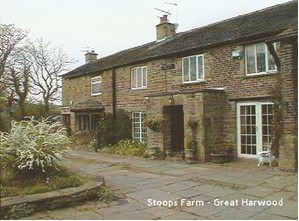
Bill could not walk far, of course, but they went to see Stoops Farm where one of the Mercers had lived. He married a Hindle girl, whose family owned the farm. They found the present owner was a lady writer who made them welcome. She had them in for a cup of tea, and they told her a bit about the family and the connection with the Hindles. They got the impression she was writing about Lancashire.
They also went to see the site of Mount Zion United Methodist Church. This beautiful church, where Eda used to sing in the choir and where they were married, was no more. It had been demolished and the site was now a grassy lot. They remembered the minister who had married them, the Reverend Septimus James Adie. They both admired him for his good common-sense sermons. He used to say, ‘If coming to the Methodist Church helps you to be a better human being, then come to the Methodist Church. But, if going to the Catholic Church helps you to live a better life, then go to the Catholic Church. Go to whichever church helps you’. He was a good man and an inspiration to both of them. When they attended church at Tighes Hill when they first arrived in Australia, they found they were only preaching ‘fire and brimstone’. Eda sent the children to Sunday school and went herself when the Methodist Church in Shortland reopened after World War Two, but Bill did not go any more.
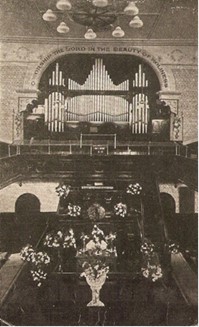
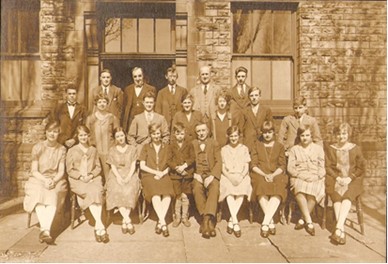
Eda is front row, third from the left.
Bill and Eda went to explore the churchyard at Harwood’s old church, St. Bartholomew’s. There were lots of old Mercer graves, quite a few Hindles, and even the grave of John Mercer who invented Mercerised cotton. He was a cotton printer and a self-taught chemist who invented dyes to colour cotton. When an infectious disease hit Great Harwood, he advised that powdered sulphur should be spread on the doorstep of every house to prevent the further spread of the disease. He discovered, in 1844, that if cotton was passed through a very mild, three per cent, bath of caustic soda (sodium hydroxide) and then through a bath of mild sulphuric acid to neutralize it, the cotton was much stronger and was easier to dye. A later development, using tension during the process, was found to give the cotton a pearly lustre. Slack mercerisation is still used to make a stretchable fabric which is used for crepe bandages. A Mercerised cotton handkerchief was woven as a gift for Queen Victoria. As a rule, she did not accept gifts, but she graciously accepted this example of the new process. John Mercer was made an FRS, a Fellow of the Royal Society, for the invention of the process that bears his name.
Bill and Eda were interested in seeing the old church register where births, deaths and marriages of family members might be entered. It had been moved to the local library and they managed to find some very old entries with the Mercer name spelled in different ways. Bill mapped out a Mercer family tree. The family tree was passed on to David, as the eldest male Mercer in the family.
They had quite dark tans from their years in Australia, and, on bus trips, some people took them for Pakistanis. They noticed them standing close and listening. Of course, when they heard their speech, they knew that Bill and Eda were English. Then they would get the questions, ‘Have you come home to stay?’ ‘No. Australia is home to us now.’
When the time came to say goodbye it was hard for Bill’s father. He was eighty nine years old and still in very good health, but he knew he would never see his son again and he wept. He died in 1965, at ninety one years of age.
When they landed back in Sydney, David and his family were there to greet them and to drive them home to Shortland. What a surprise when they saw the house! While they were away the family had got together: the girls had done up the inside of the house and the boys had repainted the outside. There had been a very wet winter while they were away, and the whole place was fresh and green for their homecoming.
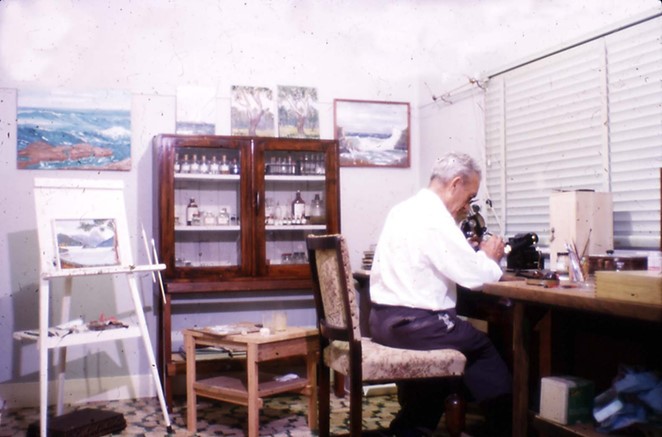
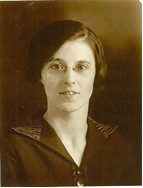
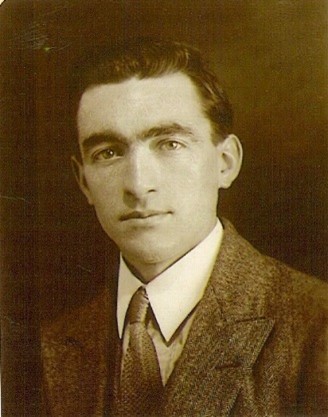
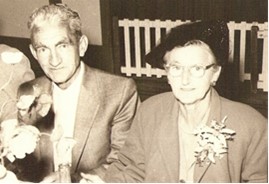
Ancestors
John Mercer was a schoolmaster and he must have been one of the few educated men of those days. He married Margaret, maiden name unknown, and died intestate on 6 April 1853. I have a probate document to this effect. Our family line was known in Great Harwood as ‘The Schoolmaster Mercers’.
As far as I can make out, John and Margaret had a son Enoch who married Catherine. I heard much talk about this Catherine from my grandmother, Ellen Mercer, who married William, one of Enoch and Catherine’s sons. She was referred to as Old Catherine, and was the matriarch of the family. She used to smoke a Church Warden pipe, which is a clay pipe with a stem eighteen inches long.
Of Enoch and Catherine’s sons, I have a faint recollection of Eli known as ‘Uncle Eli’, he was a great-uncle. He lived at Blackpool. I remember Thomas as a very old man. William, my grandfather, must have died when he was about fifty; I have no memory of him. John, who was a mason and sculptor, died before I was born. Some of his sculpture sits on the garden wall of my grandmother’s house, at 54 Delph Road, to this day. We children called one of the grotesque heads he carved ‘Ginny Greenteeth’, because green moss grew around her teeth.
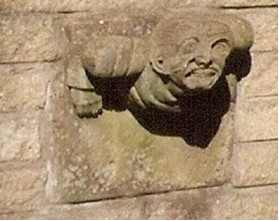
There is a long history of cotton weaving in the family. My grandmother told me that there used to be handlooms in the back room of her house.
My Grandparents, William and Ellen, nee Whitehead, had ten children, of whom six died in infancy. My grandmother Ellen Mercer died in 1921, aged 79. Their four surviving children, Mary Ellen and Emily lived well into their 80s and David, my father, died in 1965 aged ninety one. Anne, known as Aunt Annie, was still alive well into her 90s. She has since died aged ninety plus. I have a silver snuffbox which belonged to my grandfather and is inscribed ‘William Mercer 1877’.
I realise that everybody had two parents four grandparents, eight great grandparents and so on and that over the years everyone must have had thousands, nay, millions of ancestors. One can only trace the name, but it’s very interesting. When Eda and I went to England, we went to the churchyard of Great Harwood Parish Church, St Bartholomew’s. The tower is estimated to be 800 years old.
We found the gravestones of six William Mercers just around the church wall to say nothing of other Christian names. Then in the local library we found a copy of the register of births and deaths belonging to the church.
Among the first entries were:
Lanslayatt Mecr 1548 22 Oct 1549
Thomas Mecr 22 Dec 1549
Edwardus Mecr 10 Mar 1549
Ricardus Merser 1552
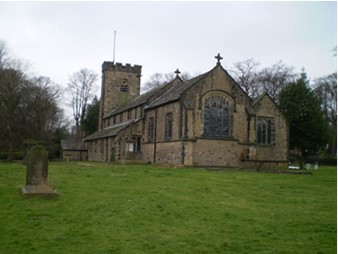
Time
Time is like a ribbon, past, present, future, and when you have written ‘present’, it is past.
The Moving Finger writes; and, having writ, Moves on: nor all thy Piety nor Wit Shall lure it back to cancel half a Line, Nor all thy Tears wash out a Word of it.56
We do not know, we cannot know, why we are here, or where we are going. We are here for seventy years, which is a mere flash in time. We can be obliterated in a hundred different ways, but time will move on, regardless. It is a wonderful, beautiful, world, and the best things in life are free; so make the best of it while you may. It might be later than you think.
William Edward Mercer 1898 – 1983
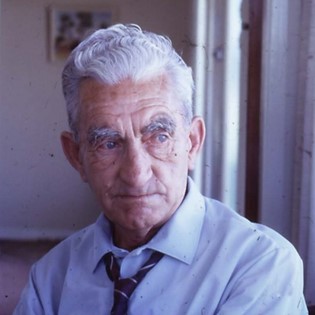
| NOTES: | |
| 1 | Board: It was customary to take a door off its hinges and use it to lay out a corpse. The body was then flat when rigor mortis set in. |
| 2 | Doorjamb: A jamb is the upright part of the wooden frame around an opening. |
| 3 | Indian Clubs: Used for developing strength and in juggling. They comprise bowling-pin shaped wooden clubs. |
| 4 | Cadging: Scrounging. |
| 5 | Anabaptists: A Christian sect. |
| 6 | Flags: Paving stones. |
| 7 | Emily Mercer sent one of these brown jugs to William’s daughter Anne, in Australia. |
| 8 | A medlar is a type of plum. |
| 9 | Delphs: Quarries. |
| 10 | Shippon: Cattle shed. |
| 11 | Buckram: A stiffened cloth. |
| 12 | Stonyhurst: Impressive Jesuit college set in the countryside. |
| 13 | Ribble Valley: An area of outstanding natural beauty following the course of the river Ribble. |
| 14 | Flying Angel: An acrobatic movement where the gymnast vaults and then lands with outstretched arms. |
| 15 | Forms: Bench seats. |
| 16 | Born in Carluke in Lanarkshire in 1888 William Angus may not be the best-known Scot in history but he is certainly one of the bravest. His rescue of a badly wounded senior officer from under the noses of the enemy during The Great War is a story of remarkable courage and selflessness. His actions saved the life of the officer and won Angus the Victoria Cross. Inevitably he became the target for German guns and he was hit again and again, sustaining injuries, which were to cost him his left eye and part of his right foot. |
| 17 | Zeps: Zeppelins. |
| 18 | Bully Beef: Corned beef. |
| 19 | Soldiers killed lice that hid in the seams of their clothing by holding them up and running a lighted match along underneath them. |
| 20 | Lord Kitchener: A British Field Marshall who played a central part in WWI. |
| 21 | Horses hooves were padded with hessian. Big covered carts carried the wounded. The axles were greased and wheels were wrapped with hessian to prevent and minimise noise. |
| 22 | Chiacking: Friendly banter. |
| 23 | Paddy’s Lucerne: A type of plant. |
| 24 | GS Wagon: General Service wagon. |
| 25 | Hoist by one’s own petard: Means to be harmed by one’s own plan to harm someone else, or to fall into one’s own trap. |
| 26 | Pot-per-mang: Permanganate of potassium, used as a disinfectant. |
| 27 | Oxo cubes: Beef stock cubes. |
| 28 | Scuppers: Opening in the side of the deck of a ship which allows water to drain off. |
| 29 | Bombay: Now known as Mumbai. |
| 30 | Poona: Now known as Pune. |
| 31 | Puggry: A 19th-century spelling of the Hindi word pagri, in English usually puggaree or puggree, referring either to a turban or to a piece of cloth worn around a sun-helmet. |
| 32 | Whaled: Attacked – tucked into. |
| 33 | Mufti: Civilian clothing. |
| 34 | Gharry: Horse drawn carriage. |
| 35 | Muttra: Now known as Mathura. |
| 36 | Derra Dun is more usually called Dehradrun. |
| 37 | Near the end of the nineteenth century, the British army had a military psychiatric sanatorium at Deolali, about 100 miles northeast of Bombay. To go ‘Doolally’, meant to go insane. |
| 38 | Henry Wadsworth Longfellow: The Village Blacksmith. |
| 39 | Lascar: Sailor or militiaman from the Indian Subcontinent. |
| 40 | Charles Wolfe: The Burial of Sir John Moore at Corunna. |
| 41 | Rudyard Kipling: Tommy. |
| 42 | John McCrae: In Flanders Fields. |
| 43 | Lloyd George: British Prime Minister 1916 -1922. |
| 44 | The economic depression in the decade prior to WWII. |
| 45 | Portmanteau: A piece of luggage, usually made of leather and opening into two equal parts. |
| 46 | Lilly Pilly: A type of tree. |
| 47 | The Dole: State unemployment benefit. |
| 48 | Rafferty’s Rules: No rules at all. |
| 49 | In those days, women stayed in bed for ten days after childbirth, often with their knees tied together. It was known as ‘lying-in’. |
| 50 | A household was allowed to have only nineteen fowls; twenty or more and you were classed as a poultry farmer and lost the dole. |
| 51 | Pollard: Cattle food. |
| 52 | Donnybrook: Brawl. |
| 53 | BHP steelworks. |
| 54 | Arteriosclerosis: Hardening of the arteries. |
| 55 | Veganin: Codeine, paracetamol and caffeine. |
| 56 | The Rubáiyát of Omar Khayyám. |